Past Newsletter Issues
Chair's Letter
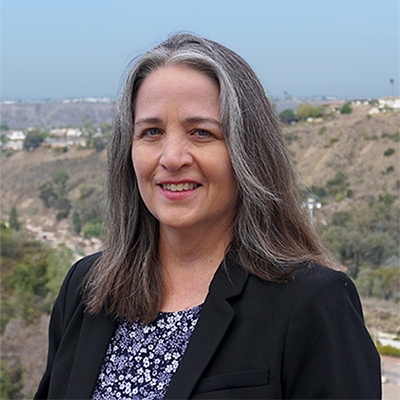 This spring semester ends, as so many others have, with commencement. So we end with a beginning or we begin with an end. And we congratulate our Class of 2025 RWS graduates! On Friday, May 16, 2025, we were excited to honor our graduates at our department ceremony. While this marks the end of our graduates’ time with the department, it also marks the beginning of what I am sure will be many more accomplishments in their work with rhetoric and writing.
This spring semester ends, as so many others have, with commencement. So we end with a beginning or we begin with an end. And we congratulate our Class of 2025 RWS graduates! On Friday, May 16, 2025, we were excited to honor our graduates at our department ceremony. While this marks the end of our graduates’ time with the department, it also marks the beginning of what I am sure will be many more accomplishments in their work with rhetoric and writing.
This has been a rewarding and challenging semester for RWS with several “firsts,” including the awarding of our first Outstanding Graduating Senior, Althea Millman, and the awarding of the Ann M. Johns Endowed Scholarship for Rhetoric and Writing Studies to its first recipient, Sammi Mrowka. You can read more about Mrowka in the newsletter with a focus on his experiences in the graduate program. We also thank Emerita Professor Ann Johns for her generosity in supporting the department and its students.
Another first for this semester has been our department’s offering of RWS 360W, a course developed and taught by Kimball Taylor in collaboration with SDSU’s Surf/Skate Collaborative. This course “applies an academic lens to the development of board sports, evaluating and analyzing the rhetorics that have defined, shaped, and explained these activities.” You can read more about Taylor in the newsletter.
This newsletter also features current undergraduate John Troja, and graduating senior Marrisa Lee, a double major in RWS and public relations. We share an overview of the 23rd Landmark Lecture, and highlight two of the alumni panelists who joined us: Erik Acosta (B.A.) and CiCi Hendricks (M.A.). In addition to our alumni who spoke about how rhetoric and writing studies informs their work in professional contexts, we were pleased to hear from our keynote speaker, Kendall Leon, who spoke on the many ways rhetoric matters.
While I am happy to share these wonderful events with you, I am also deeply saddened to share news of the passing of two beloved RWS colleagues and faculty members. We lost Roderick Michener in January and Chelsea Kerford in March, 2025. As we grieve for their passing, we also recall the many contributions they have made to the department and the impact their teaching and departmental work continues to make in the lives of the students they worked with and in our lives as their colleagues.
Kathryn Valentine,
RWS Department Chair
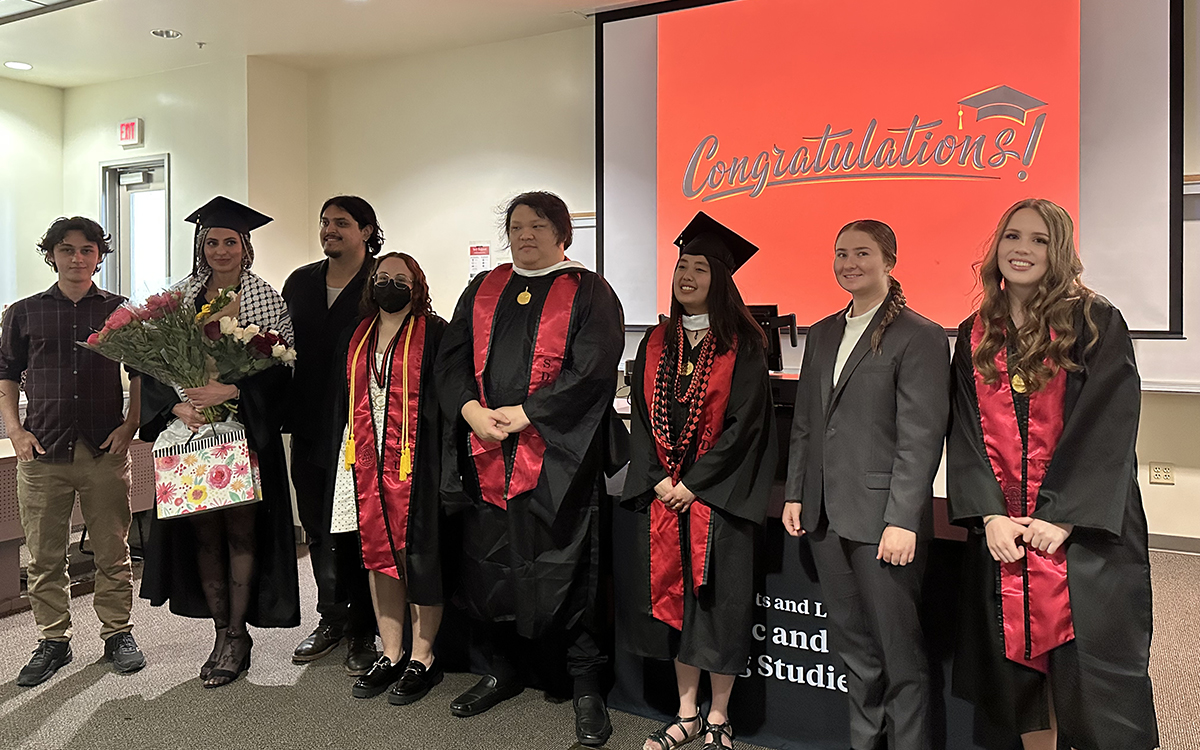
 This spring, the RWS Department welcomed Kendall Leon to speak at the 23rd iteration of the RWS Landmark Lecture: “Rhetoric at Work.” The Landmark Lecture is an annual event for scholars in the RWS field to come together and discuss on-going research and pedagogies. Through an alumni student panel and a keynote presentation, “Rhetoric at Work” shared “[insights] into the various pathways, ethical issues, and challenges that writing and communication professionals face in today’s global and diverse workforce.”
This spring, the RWS Department welcomed Kendall Leon to speak at the 23rd iteration of the RWS Landmark Lecture: “Rhetoric at Work.” The Landmark Lecture is an annual event for scholars in the RWS field to come together and discuss on-going research and pedagogies. Through an alumni student panel and a keynote presentation, “Rhetoric at Work” shared “[insights] into the various pathways, ethical issues, and challenges that writing and communication professionals face in today’s global and diverse workforce.”
The department thanks undergraduate alumni Erik Acosta and John Berry, and graduate alumni Abe Alvarez and CiCi Hendricks for their participation on the panel. Led by Associate Professor Dustin Edwards, they spoke on how they navigate and succeed in their workplaces using skills learned from their study of rhetoric and writing while at SDSU. In particular, they named the ability to rhetorically analyze a situation as invaluable for their everyday work, from technical writing to grant writing and management.
The department is also grateful for Leon’s keynote presentation on how rhetoric and writing studies can prepare professionals with a “range of skills needed in industry settings.” Leon is a former CSU professor who specializes in Chicana rhetorics, community-engaged writing, and technical and professional communication. She has successfully stepped into writing-intensive industry roles, “[bridging] the academic-industry divide.” Her background allows her to explore the importance of rhetoric-related skills in the workplace. “Rhetoric and writing provides a framework and perspective that applies to all careers,” she explains. “[It] helps develop a rhetorical mindset grounded in awareness of the situation, audience attunement, genre analysis and linguistic competence and flexibility.”
Leon emphasizes “understanding user needs and practices” as increasingly crucial skills, following AI integration’s impact on the field of technical communication. She concludes her presentation with encouragement for young professionals in rhetoric and writing: “In today’s climate, we need more people in a range of careers thinking about ethics, power and agency, the material consequences of words, and the intent or motivation behind words and action. More emphasis on making and production than analysis and critique.”
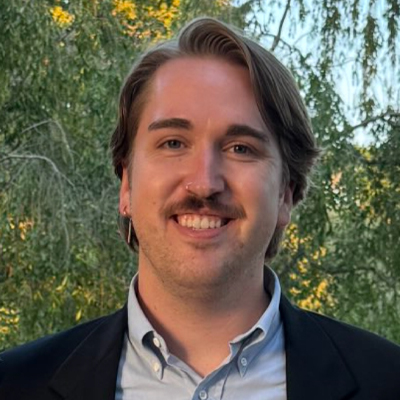 A dedicated student of rhetoric, an aspiring educator, and an active community member, John Troja exemplifies the diverse and meaningful paths available to students in San Diego State University’s Rhetoric and Writing Studies (RWS) program. Now in his third year, Troja’s journey to RWS reflects both his passion for language and his drive to make a lasting impact in and beyond the classroom.
A dedicated student of rhetoric, an aspiring educator, and an active community member, John Troja exemplifies the diverse and meaningful paths available to students in San Diego State University’s Rhetoric and Writing Studies (RWS) program. Now in his third year, Troja’s journey to RWS reflects both his passion for language and his drive to make a lasting impact in and beyond the classroom.
Originally entering SDSU as a Television, Film, and New Media (TFM) major, Troja discovered the RWS program through his sister, who had studied the field when she was in college. However, it was his experience in RWS 200 that solidified his decision to change paths. “I was hooked,” he recalls. The course introduced him to rhetorical concepts in a way that felt both intellectually engaging and personally meaningful.
Troja’s background is quite unique. He has worked professionally as a copywriter and pastry chef and is currently gaining hands-on experience as a student teacher at a local high school. His weekends are spent volunteering at the public library, and in his free time, he enjoys creative writing, baking, and watching films. These experiences, varied yet interconnected, speak to his core values of communication, service, and creativity.
When asked about the most influential courses in his RWS experience, Troja pointed to RWS 414: Rhetoric in Visual Culture with Associate Professor Jennifer Sheppard. The course, which focused on multimodal approaches to rhetoric, expanded his understanding of rhetorical practice beyond traditional text-based analysis. “It felt like unlocking a door I didn’t know existed,” he explains, noting that the course encouraged him to explore modern, visual, and interactive rhetorical forms.
Another defining moment in his academic development came through learning stasis theory in a course with Assistant Professor Consuelo Salas. Troja credits this framework with shaping the way he approaches academic, professional, and personal communication. “Being conscious of foundational understandings makes all communication easier,” he says, emphasizing the practical value of rhetorical theory in real-world contexts.
As graduation approaches, Troja looks forward to earning his teaching credential and pursuing a career in education, with the goal of teaching writing at the high school level. He also hopes to devote more time to his personal writing and eventually publish creative work. While excited for the future, he acknowledges the meaningful connections he has formed in the RWS community and the lasting impact they’ve had on his academic and personal growth.
Troja’s journey through the RWS program highlights the power of rhetoric not only as an academic discipline but as a means of connection, expression, and purposeful action. His commitment to education and community service positions him as a thoughtful and impactful future educator.
 Marissa Lee is an undergraduate student in her final year at SDSU, double majoring in public relations and rhetoric and writing studies. As a San Diego local, Lee saw attending SDSU as a chance to stay in the area while meeting her academic goals. She has been working hard to pursue a career in public relations, after a job shadowing experience in middle school sparked her love of the field. However, the field’s writing conventions are “strict in style, format and delivery” and Lee searched for “an additional writing option that promoted critical thinking skills.” Based on her experiences in RWS 100 and 200, she discovered the RWS major as an opportunity to keep developing skills in writing and critical thinking.
Marissa Lee is an undergraduate student in her final year at SDSU, double majoring in public relations and rhetoric and writing studies. As a San Diego local, Lee saw attending SDSU as a chance to stay in the area while meeting her academic goals. She has been working hard to pursue a career in public relations, after a job shadowing experience in middle school sparked her love of the field. However, the field’s writing conventions are “strict in style, format and delivery” and Lee searched for “an additional writing option that promoted critical thinking skills.” Based on her experiences in RWS 100 and 200, she discovered the RWS major as an opportunity to keep developing skills in writing and critical thinking.
Over the course of Lee’s study, her understanding of rhetoric shifted from a “generalized argument” to “meaning making.” She recalls comparing her experiences in the program for her younger sister, who recently took her first RWS course, to a scene in the film “The Devil Wears Prada” where the significance behind a certain color is discussed. Lee says, “There is meaning to everything!”
Lee mentions RWS 496: Rhetoric of Personal Writing and Self-Care as one of her favorite courses. In this course, she explored self-care by completing exercises on “different acts of self-care” and analyzing her experiences. She also completed a project where she wrote letters to her past, present, and future selves. Lee reflects on her main takeaway: “Oftentimes in RWS courses we are evaluating the writing of others. Through this course, we were able to examine our own personal writing to explore our ethos.”
The program has been invaluable in preparing her for a future career in communications, public relations, or marketing. “RWS provided me with a unique strategic mindset that sets me apart from other applicants,” Lee says. She names the ability to evaluate an audience’s perspective as the most important skill she learned at SDSU. During an internship in creator management, she put it into practice. Lee explains this process: “I pitched online influencers to brands for collaboration. These pitches were often cold-call emails. Since I was ‘meeting’ the recipient for the first time, I would have to tailor and write a pitch that would be the most compelling to them. This is where the audience's perspective comes in.” In addition, she had the opportunity to attend a panel for RWS alumni and receive advice on transitioning from academia to the workforce.
After graduation, she intends to work for a public relations agency, managing multiple clients, to keep exploring “different niches” as she had in the program. Lee has greatly enjoyed her time here at SDSU and thanks the RWS Department for their support. In a parting message for incoming students, she hopes they will also see the program as a “space for [them] to explore academic writing from a plethora of different authors” and “room for [them] to tailor the projects to one of [their] interests.” “All of my RWS professors have tried to help me grow,” she adds. “You will constantly be learning and developing for the better.”
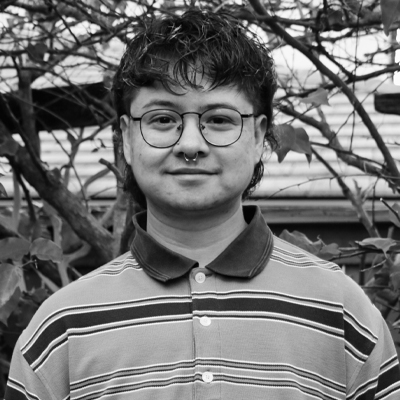 Sammi Mrowka, set to graduate this May, is a graduate student in the RWS M.A. program with a focus in professional writing. He always intended to pursue graduate studies, but was uncertain about which discipline would be best for his academic and professional interests until he spoke with people involved in the program about their experiences. “[The program] finally gave me the language to describe the type of work and research I was passionate about,” Mrowka explained. Although he had no background in rhetoric, having majored in psychology and minored in philosophy at Point Loma Nazarene University, his undergraduate studies provided him with a “well-rounded approach to analyzing rhetoric.”
Sammi Mrowka, set to graduate this May, is a graduate student in the RWS M.A. program with a focus in professional writing. He always intended to pursue graduate studies, but was uncertain about which discipline would be best for his academic and professional interests until he spoke with people involved in the program about their experiences. “[The program] finally gave me the language to describe the type of work and research I was passionate about,” Mrowka explained. Although he had no background in rhetoric, having majored in psychology and minored in philosophy at Point Loma Nazarene University, his undergraduate studies provided him with a “well-rounded approach to analyzing rhetoric.”
When asked about meaningful courses taken, he recalls RWS 730: Gender and Rhetoric with Professor Suzanne Bordelon and RWS 602: Modern Rhetoric with Dustin Edwards as “instrumental” in exploring his research interests and preparing for his thesis. His thesis explores evangelical rhetoric’s impact on societal attitudes regarding LGBTQ+ individuals and how their narratives resist or reclaim their identities. As a queer, transmasculine person, the topic holds great significance for Mrowka. He envisions his thesis study as the beginning of impactful work: “I want to continue the work of my thesis by developing educational and workshop materials that address religious trauma and the importance of sharing embodied experiences. My goal is to create accessible resources that foster conversations about the impact of evangelical rhetoric on LGBTQ+ individuals.”
Outside the classroom, Mrowka works as a graduate assistant for the RWS Department, providing strategies to “strengthen and expand the program.” He developed recommendations by gathering undergraduate and graduate students’ insights on their experiences, goals, and perspectives. In addition, he assists the SDSU Pride Center as a graduate student Pride House lead, supporting Pride House, a mentorship program for first-year undergraduate LGBTQ+ students.
Reflecting on his time at SDSU coming to a close, Mrowka expresses gratitude for the department in supporting his academic and professional interests. He plans to apply skills he learned from the program to a career in technical writing, professional writing, or project management. Mrowka ends with valuable lessons for current RWS students: “Take full advantage of everything the program has to offer! The faculty and staff genuinely want to see you succeed, so don’t hesitate to reach out, whether for academic guidance, accommodations, or conversations about the evolving field of rhetoric. Building those connections can make all the difference in your experience and future career.”
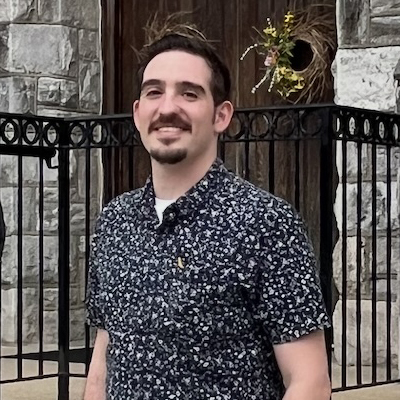 In spring 2022, Erik Acosta graduated from San Diego State University with a bachelor’s in rhetoric and writing studies. He currently works as a technical writer and project manager specializing in strategic supply chain products for General Atomics Aeronautical, a private company that manufactures aircraft. Acosta likens his position to an “internal ‘journalist’” applying what he learned from rhetoric and writing studies to support “the mission of ‘build plans and get them to fly.’” He explains this process: “I use the rhetoric of aviation, federal and legal compliance, and business, to produce documents that aid in decision-making, and balance competing interests via diplomacy. I have to read and understand [federal law’s implications] in my decision-making [and] the rhetoric of advanced technologies [to] translate them into business ‘leet speak.’”
In spring 2022, Erik Acosta graduated from San Diego State University with a bachelor’s in rhetoric and writing studies. He currently works as a technical writer and project manager specializing in strategic supply chain products for General Atomics Aeronautical, a private company that manufactures aircraft. Acosta likens his position to an “internal ‘journalist’” applying what he learned from rhetoric and writing studies to support “the mission of ‘build plans and get them to fly.’” He explains this process: “I use the rhetoric of aviation, federal and legal compliance, and business, to produce documents that aid in decision-making, and balance competing interests via diplomacy. I have to read and understand [federal law’s implications] in my decision-making [and] the rhetoric of advanced technologies [to] translate them into business ‘leet speak.’”
When asked about an interesting project Acosta has completed, he recalls drafting and publishing manuals on flight and ground operations. He states: “My main job was to interview pilots, aircrew, technicians and mechanics to understand the inner workings of specific airfields, and I loved talking to every one of those folks. The inner workings of ‘making planes fly’ is an extremely complex endeavor!”
Acosta credits his career success to the RWS department. His study of RWS helped him take his “technical skills (fixing helicopters and airplanes) to the next level.” “RWS seemed to ‘marry’ perfectly to the skills I already had with the professional development that was necessary for me to transition into the technical writing and editing trade,” Acosta notes. Through his degree, he learned how to market himself as a professional, gained the ability to understand highly technical language, and developed the rhetorical skills necessary for speaking in cross-disciplinary contexts as two examples. “All incredibly valuable skills that translated into a paid job and future professional endeavors,” he says.
During his time in the RWS undergraduate program, he mentions a few professors as crucial to his academic journey. Through Jennifer Sheppard’s guidance, Acosta learned how to utilize visual rhetoric and create proposals for a professional audience; he continues to use these skills in his everyday work. In addition, Steve Merriam’s “passion for language” inspired him to approach language in more nuanced ways. Associate Professor Linn Bekins’ encouragement during a tough internship gave him the strength to push through difficulty and try again. In Professor Glen McClish’s classroom, Acosta enjoyed discovering the “timeless value” of ancient rhetoric. He identifies the “Mytilenean Debate” by Thucydides as a text that has stayed with him as it shows the potential of rhetorical appeals’ power for achieving “positive ends.”
Three years into Acosta’s post-graduation life, he still enjoys reading about “anything that piques [his] interests” and “[obsessing over the] nuances of applied language.” He looks back fondly on his time at SDSU, thanking the RWS department for their kind encouragement in his studies.
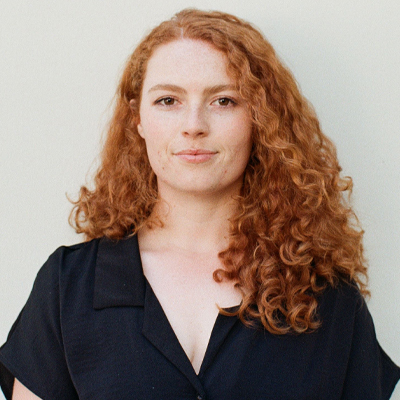 Cici Hendricks’ academic and professional journey reflects the power of rhetoric to shape not only arguments but also careers. A graduate of the RWS master’s program, Hendricks now applies rhetorical principles daily in a technical writing role within the environmental consulting and testing industry. Her current work centers on crafting detailed reports related to hazardous materials testing, combining analytical skill with practical communication strategies.
Cici Hendricks’ academic and professional journey reflects the power of rhetoric to shape not only arguments but also careers. A graduate of the RWS master’s program, Hendricks now applies rhetorical principles daily in a technical writing role within the environmental consulting and testing industry. Her current work centers on crafting detailed reports related to hazardous materials testing, combining analytical skill with practical communication strategies.
Though Hendricks’ present-day focus is highly specialized, her approach to learning has always been expansive. “As a student, I wanted to learn as much as possible from any and all sources,” she recalls. This curiosity led her to conduct informational interviews with professionals across disciplines. Over time, she refined her approach, shifting from broad information gathering to targeted research aimed at deepening her career expertise, a transition she describes as moving from a deductive to an inductive style of inquiry.
Her pathway to the RWS program began during her undergraduate years as an English major. While she enjoyed literary analysis, Hendricks gravitated more toward editing, publishing, and rhetorical studies rather than creative writing. After earning her degree and navigating the uncertainty of the COVID-19 pandemic, she recognized a desire to further develop her skills and found the RWS graduate program to be a perfect fit. “It gave me the opportunity to keep learning and to explore a more applied form of writing and communication,” she says.
Looking back, Hendricks cites her master’s thesis as one of the most formative and rewarding projects she has undertaken. Guided by her thesis chair, Dustin Edwards, and her committee, she developed, researched, and authored the work from start to finish. “It was a passion project,” she says. “It’s still the largest document I’ve written as the sole author, and something I look back on with pride.”
Beyond academics, Hendricks emphasizes the significance of community in her graduate experience. The community she found provided a collaborative and supportive environment that fostered growth and lasting connections. “Everyone was so talented and generous with their time. Watching them pursue their own thesis projects was inspiring,” she reflects.
When asked what has stayed with her most from the program, Hendricks points to an important three concepts: audience, context, and purpose. “If you keep those in mind, you are really setting yourself and your project up for success,” she advises. She also credits professors such as Linn Bekins and Dustin Edwards with mentoring her through pivotal moments of her academic and professional development.
Today, Hendricks continues to apply the lessons of rhetoric in a tangible and impactful setting. “I wouldn’t have even known this industry existed without the RWS program,” she says. “It helped me find a career that connects my love of language with real-world application.”
 With a career that bridges the fast-paced world of journalism and the reflective discipline of teaching, Lecturer Kimball Taylor brings a rare and dynamic perspective to San Diego State University’s Department of Rhetoric and Writing Studies (RWS). Since returning to SDSU in 2017, Taylor has dedicated himself to guiding students not only in the mechanics of writing but in the art of critical thinking — a skill he believes is essential for both personal growth and civil engagement.
With a career that bridges the fast-paced world of journalism and the reflective discipline of teaching, Lecturer Kimball Taylor brings a rare and dynamic perspective to San Diego State University’s Department of Rhetoric and Writing Studies (RWS). Since returning to SDSU in 2017, Taylor has dedicated himself to guiding students not only in the mechanics of writing but in the art of critical thinking — a skill he believes is essential for both personal growth and civil engagement.
Taylor’s connection to SDSU began during his time as a graduate student in the university’s MFA program. After earning his degree, he spent the next decade working as a journalist, traveling widely and immersing himself in compelling stories. “Journalism gets you out in the world and exposes you to the most interesting people and situations,” he explains. “But teaching is the other side of that coin. One is about collecting ideas; the other is about dispersing them.” For Taylor, both roles fulfill a shared purpose of engaging with ideas and communicating them meaningfully.
His teaching style reflects his passion for writing and his belief in the power of structure. “There are small, common-sense things that can improve anyone’s writing,” he says, noting that helping students understand how to build and analyze arguments is central to his approach. He often emphasizes structure not only as an organizational tool, but as an extension of the argument itself — something that can mirror and enhance rhetorical purpose. He emphasizes this in one of his classes, The Rhetoric of Board Sports, which he designed and taught this spring semester. The creation of the course was inspired by Taylor’s experience with the SDSU’s Surf/Skate Collaborative and his concept of using board sports as a lens through which to teach writing and rhetoric.
Taylor was drawn to the RWS Department’s unique position within the university. As he points out, every student at SDSU engages with the department through composition courses. “We come into contact with everyone,” he says. “I like that utilitarian idea. One of the core things we’re teaching is critical thinking — and I want to live in a community of critical thinkers.” He sees the department’s work as foundational to building a more thoughtful and engaged society, beginning with the student body and extending outward into the broader San Diego community.
Looking ahead, Taylor acknowledges the evolving challenges facing the discipline, particularly with the rise of artificial intelligence. “The department has a huge challenge,” he says. “AI is already impacting composition and critical thinking, and we’ll need to adapt quickly.” Despite these shifts, Taylor remains committed to the enduring value of rhetoric. At its core, he argues, rhetoric is about navigating the arguments we encounter and create in daily life — from personal relationships to public discourse. “To the extent that we can analyze and build arguments well, we’re all better off,” he notes.
Outside the classroom, Taylor continues his work as a journalist, with current projects underway that remain confidential until publication. Still, the influence of journalism permeates his teaching, especially in his focus on structure and storytelling as vehicles for effective argumentation.
For students navigating their own academic paths, Taylor encourages attention to the form and function of their writing. “The structure on the page is part of the argument,” he says. “If you can master that, your writing becomes something much more powerful.”
Meet the Editors
Amy Fong
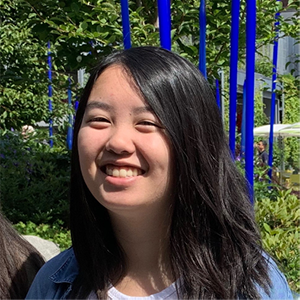
Amy Fong is a second-year graduate student for the M.A. program in rhetoric and writing studies. When she was working toward a B.A. in English here at San Diego State University, her undergraduate advisor recommended trying her hand at the Certificate in Professional Writing program offered by the RWS Department. During this period, Fong developed further interest in what rhetorics could offer her professionally and personally. After finishing her B.A., she decided to apply for the M.A. program with a focus in professional writing to help develop her career in technical writing. Fong is thankful to RWS Chair Kathryn Valentine for the opportunity to continue working with the department.
Kee James

Kee James is a Seattle native and writer set to graduate in fall 2025 with a B.A. in rhetoric and writing studies from San Diego State University. With a strong background in research, rhetoric, and editing, she is especially passionate about investigative journalism and the role of language in driving social change. James hopes to build a career in the publishing industry, where she can continue exploring the power of storytelling and truth-seeking. When she’s not writing or editing, you’ll likely find her reading a good book with a strong cup of coffee in hand — her favorite way to recharge.
Chair's Letter

 Looking over this issue of the newsletter, I note the many paths that students and faculty take into, through, and out of the department as we explore rhetoric and writing. I am grateful for what newcomers, such as Jennifer Burke Reifman, our newest faculty colleague, bring to the department as their experiences and perspectives inform how we write and how that writing shapes the world. At the same time, I am appreciative of how current students, Mateo Olloqui, who recently completed the RWS major, Matthew Miuccio, an RWS minor, and Lydia Rojratanakiat, an RWS graduate student, international student, and teaching associate, shape the study of writing and rhetoric through their own backgrounds and through the connections they make at SDSU. Last, I am also excited to see former students find rhetoric and writing nourish not only their sense of who they are but also their career pathways as technical writers and professional tutors. I hope you will enjoy reading about them as much as I did! I also hope you enjoy this photo of recent alumni and faculty at a Padres game in summer 2024.
Looking over this issue of the newsletter, I note the many paths that students and faculty take into, through, and out of the department as we explore rhetoric and writing. I am grateful for what newcomers, such as Jennifer Burke Reifman, our newest faculty colleague, bring to the department as their experiences and perspectives inform how we write and how that writing shapes the world. At the same time, I am appreciative of how current students, Mateo Olloqui, who recently completed the RWS major, Matthew Miuccio, an RWS minor, and Lydia Rojratanakiat, an RWS graduate student, international student, and teaching associate, shape the study of writing and rhetoric through their own backgrounds and through the connections they make at SDSU. Last, I am also excited to see former students find rhetoric and writing nourish not only their sense of who they are but also their career pathways as technical writers and professional tutors. I hope you will enjoy reading about them as much as I did! I also hope you enjoy this photo of recent alumni and faculty at a Padres game in summer 2024.
Kathryn Valentine,
RWS Department Chair
Faculty Profile: Jennifer Burke Reifman
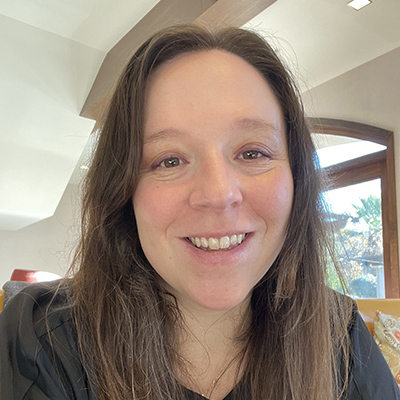 Jennifer Burke Reifman, a passionate educator and mother of two, joined the RWS Department this academic year after over a decade of writing, teaching, and research experience up and down California and near her hometown in Philadelphia. With an M.A. from San Francisco State University and a Ph.D. from UC Davis, Burke Reifman “arrived in the field of rhetoric and writing studies through a general love for writing.” Her love for writing began in high school, where she spent time reading and starting an underground newspaper. Studying journalism in college, Burke Reifman credits her professors for fostering her self-image as a writer and possible educator. From there, the more she experienced, the more confident she became in her path—time in the classroom and learning to research quickly cemented her future as the professor and researcher she is today.
Jennifer Burke Reifman, a passionate educator and mother of two, joined the RWS Department this academic year after over a decade of writing, teaching, and research experience up and down California and near her hometown in Philadelphia. With an M.A. from San Francisco State University and a Ph.D. from UC Davis, Burke Reifman “arrived in the field of rhetoric and writing studies through a general love for writing.” Her love for writing began in high school, where she spent time reading and starting an underground newspaper. Studying journalism in college, Burke Reifman credits her professors for fostering her self-image as a writer and possible educator. From there, the more she experienced, the more confident she became in her path—time in the classroom and learning to research quickly cemented her future as the professor and researcher she is today.
Burke Reifman is propelled by her love for discussing writing with students and her desire to think critically about the systems she engages with. Her teaching style reflects this drive, emphasizing student engagement through a fun, interesting, and, most importantly, relatable curriculum. Burke Reifman’s ultimate goal is to ensure students feel seen in their studies, assured by the knowledge that their lives are intertwined with their college experiences. She connects this teaching tenant to her educational experiences: “I spent a lot of time trying to figure out how to distance myself from my home literacy practices to seem like I ‘belonged’ in college. Turns out, my home literacies were really cool and important [to my education]!”
Burke Reifman’s embrace of her home literacies informs her current research, which primarily focuses on teaching writing and writing programs. She aims to create “more equitable spaces in writing programs” by including historically excluded voices.
As she settles into her role at SDSU, Burke Reifman finds herself “earnestly so happy” to realize her goal of serving such a diverse undergraduate and graduate student body. She is excited about all aspects — both rewarding and challenging — of the teaching and mentoring process. In the classroom, Burke Reifman looks forward to “discuss[ing] personal dialects as a way of talking about language and power.” Between discussions about their home language practices and reflections on what they have learned, she enjoys any opportunity to get to know her students.
Burke Reifman hopes to be the type of teacher she needed most in college — a professor who can both support and challenge her students. As a scholar, she values her place in the world of rhetoric and writing studies. She understands rhetoric’s importance outside academia, making and unmaking meaning: “Our engagement in rhetoric and literacy is how we make and remake the world around us. It’s fundamental for participating in systems of power and even more so in deconstructing those systems.”
Burke Reifman encourages current students and scholars in the department to find their place in this rhetoric-made world, prompting them not to “be afraid to change [their] mind” in their educational or professional pursuits. After only a semester at SDSU, Burke Reifman’s love for writing, passion for diverse literacies, and respect for her students place her right at home in the Rhetoric and Writing Studies Department. We welcome her with open arms.
Undergraduate Major Profile: Mateo Olloqui
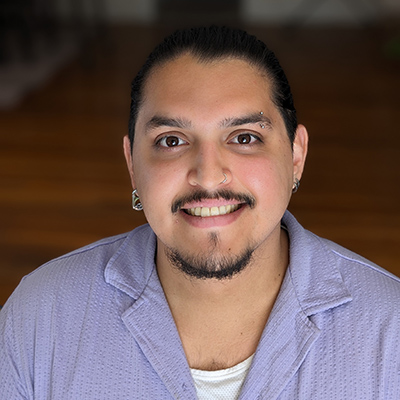 Mateo Olloqui is a rhetoric and writing studies major in his final semester at SDSU. Olloqui is happy to receive his degree after a six-year gap, completing most of his studies between 2015 and 2018. Despite his time away, Olloqui has remained committed to RWS. He first discovered the department while taking RWS 200 as a general education requirement. After enjoying the course, his professor encouraged him to pursue the major. At the time, Olloqui, a marketing major, did not know the department existed and saw it as a more flexible opportunity better suited to his interests in understanding a writer’s intentions and communication choices. While these interests might have led him to other similar or related areas of study, Olloqui says he “felt like RWS had a practicality and professionalism that creative writing or literature lacked.”
Mateo Olloqui is a rhetoric and writing studies major in his final semester at SDSU. Olloqui is happy to receive his degree after a six-year gap, completing most of his studies between 2015 and 2018. Despite his time away, Olloqui has remained committed to RWS. He first discovered the department while taking RWS 200 as a general education requirement. After enjoying the course, his professor encouraged him to pursue the major. At the time, Olloqui, a marketing major, did not know the department existed and saw it as a more flexible opportunity better suited to his interests in understanding a writer’s intentions and communication choices. While these interests might have led him to other similar or related areas of study, Olloqui says he “felt like RWS had a practicality and professionalism that creative writing or literature lacked.”
Ultimately choosing to call RWS home, the department has fostered his interests. The major’s required internship stands out to Olloqui amidst his experiences. Though “long and tedious,” he completed the internship, encouraging any current or future RWS majors to “stay consistent and keep reaching out to whatever opportunities appear.”
Olloqui cites RWS 510: Rhetoric and Culture (now RWS 410) as the most impactful course in the program because of its challenging but consequently rewarding nature. He specifically enjoyed learning about abolitionists and women’s rights activists like Sojourner Truth and Frederick Douglass, working with some of their speeches to understand the process of constructing such meaningful arguments.
Olloqui finds his own meaning in understanding this process. His ventures in this field have left him with the surprising truth that everyone uses rhetoric daily, now with the ability to notice the many small ways it shows up in people’s choices. “First impressions, word choices, and tone of voice have so much power…. I pay attention to the little things so much more because of my work here and I know I will bring a fresh perspective to my next job….” Olloqui takes comfort in rhetoric's open-ended possibilities and is confident, thanks to the skills he has developed from the major, that he can adapt to the various disciplines and settings in which it is used. “It is like someone gave me a magnifying glass in a world of near-sighted people who don't have glasses,” Olloqui shares.
Olloqui credits the grace and kindness of everyone in the RWS department for making his experience at San Diego State University so successful. He wishes to thank the department for meeting him where he was and accommodating the “financial and mental obligations” that put his studies on hold in 2018. The department is grateful for Olloqui’s loyalty to the program and wishes him all the best after graduation.
Undergraduate Minor Profile: Matthew Miuccio
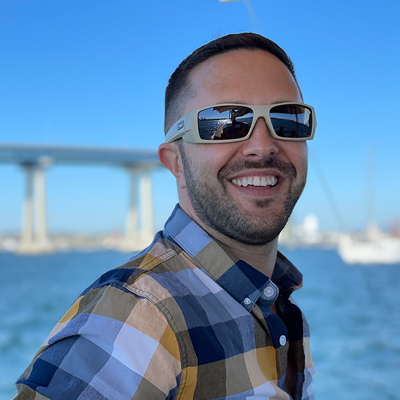 Matthew Miuccio is an undergraduate in his final year as a political science major, minoring in rhetoric and writing studies. He joined the department after transferring to San Diego State University in his third year, seeking a place where he could strengthen his writing skills for future career endeavors. His introduction to the program was RWS 411: Digital Rhetorics. However, his love and passion for the department took hold the following semester with RWS 410: Rhetoric and Culture. What lies at the heart of Miuccio’s commitment to the program? One word: intersectionality. Long inspired by classical Greek methodologies and philosophy, he chose RWS over other departments for its coverage of such a broad array of contemporary issues and subjects. “The fact that I could be creative while creating genuine meaning with my words galvanized my choice in RWS,” Miuccio shares.
Matthew Miuccio is an undergraduate in his final year as a political science major, minoring in rhetoric and writing studies. He joined the department after transferring to San Diego State University in his third year, seeking a place where he could strengthen his writing skills for future career endeavors. His introduction to the program was RWS 411: Digital Rhetorics. However, his love and passion for the department took hold the following semester with RWS 410: Rhetoric and Culture. What lies at the heart of Miuccio’s commitment to the program? One word: intersectionality. Long inspired by classical Greek methodologies and philosophy, he chose RWS over other departments for its coverage of such a broad array of contemporary issues and subjects. “The fact that I could be creative while creating genuine meaning with my words galvanized my choice in RWS,” Miuccio shares.
Following his interest in intersectionality, it is no surprise that RWS 410 left a lasting impression beyond simply sparking his love for RWS: “It opened my mind to the constellating ways in which people from dissimilar backgrounds make meaning together and how beautiful that can be.” Miuccio explains that he is specifically curious about the intersections between cultural identity, political integrity, historical progress, and social philosophy — predominant themes in RWS 410.
In the wider scope of Miuccio’s studies within the department, he has learned how to deliberately and objectively understand and apply a blend of classical and modern ideologies, along with their respective rhetorical devices. This process reveals the primary insights he will take away from the program: a writer’s linguistic practices and intentions. “The highlight of my experience has been being given the wisdom to recognize [and empathize with] a writer’s values and ingenuity...”
Armed with heightened empathy and awareness, Miuccio plans to acquire an M.A. and Ph.D. after completing his undergraduate work next semester. With further education, he will be prepared to transfer what he has learned in RWS into a career as a government policy advisor. “I aim to help shape policies that bring us closer together as a society,” he explains. Miuccio's passions lie in taking an intersectional approach to legislation, using his rhetorical knowledge and writing skills to construct inclusive policies through “language [that] shapes power dynamics and societal structures.”
Miuccio is right at home in the department, with ambitions that echo the program’s focus on strengthening a lens of cultural and social awareness through which to make meaning in this world. He is pleasantly surprised by its multifaceted nature, valuing this focus deeply. Ultimately, Miuccio puts it best, “At its core, RWS is grounded in the belief that diversity enhances the meaning and power of written and artistic expression. Through rhetoric, we learn how to engage with different audiences, convey complex ideas, and appreciate how our unique backgrounds contribute to the richness of our communication.”
Graduate Student Profile: Lydia Rojratanakiat
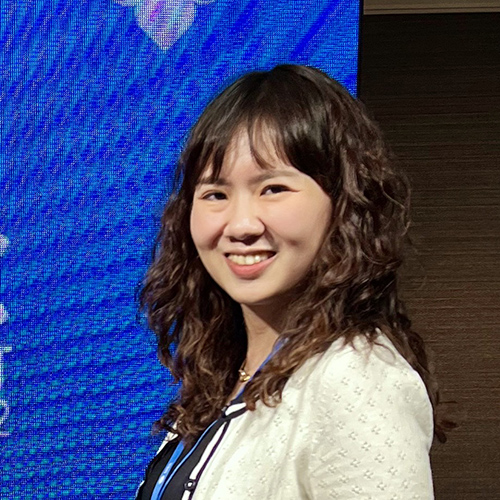 Lydia Rojratanakiat is a second-year international graduate student in the RWS Department’s M.A. program. Hailing from Thailand, she graduated from Thammasat University with a degree in politics and international relations and later received an M.A. in communications from USC Annenberg School. She worked in various areas of political communication, such as “reputation management” and “crisis communication” for the Thai government, but she wanted to further hone her writing skills through another M.A. program. “I wanted to dive into a specialization that resonated with my values and ambitions,” she explains. The factors that led her to choose SDSU were friendly cohorts, professors investing in their students’ success, and a place “for serious scholarship with a human touch.” Additional opportunities to take her career in a new direction were also appealing. “I knew right away that I wanted to be part of a program that prioritized real-world readiness, not just theory. RWS is a significant department at SDSU, offering countless opportunities to practice and refine our writing skill,” she says.
Lydia Rojratanakiat is a second-year international graduate student in the RWS Department’s M.A. program. Hailing from Thailand, she graduated from Thammasat University with a degree in politics and international relations and later received an M.A. in communications from USC Annenberg School. She worked in various areas of political communication, such as “reputation management” and “crisis communication” for the Thai government, but she wanted to further hone her writing skills through another M.A. program. “I wanted to dive into a specialization that resonated with my values and ambitions,” she explains. The factors that led her to choose SDSU were friendly cohorts, professors investing in their students’ success, and a place “for serious scholarship with a human touch.” Additional opportunities to take her career in a new direction were also appealing. “I knew right away that I wanted to be part of a program that prioritized real-world readiness, not just theory. RWS is a significant department at SDSU, offering countless opportunities to practice and refine our writing skill,” she says.
Before starting the program, Rojratanakiat had thought of rhetoric as only a minor aspect in political science and communication, but she still “felt its presence” throughout her work. Joining RWS has created a “profound” shift in her perspective, whereby rhetoric has evolved from a “tool” to a fully realized discipline. “In RWS, we’re encouraged to dive into any topic that reveals these complexities,” Rojratanakiat notes. For her interests, she finds herself circling back to power dynamics as well as rhetoric and content creation’s intersection “in terms of influence and representation.”
One of her favorite courses is RWS 543: Rhetoric of Visual Composing with Jennifer Sheppard. This course helped her develop a foundation of the knowledge necessary to dig into data-driven stories and visuals. “Going in, I had no real background in visual rhetoric or data visualization, which is where so much of today’s communication is heading,” she states. She also emphasizes loving how her professors meet her where she is, instead of expecting expert-level knowledge, to ensure courses are appropriately “both challenging and deeply rewarding.”
When the opportunity for practical experience arrived, Rojratanakiat hadn’t expected it to be teaching, but she embraced the position. This is her second semester working as a teaching associate, teaching first-year writing. She enjoys guiding students in realizing how valuable writing is outside the classroom. “It’s a lifelong skill, a form of self-expression that’s everywhere in the world around them,” she asserts. “In my TA role, I’m already seeing how students light up when they realize the power of writing and rhetoric as a way to shape their reality.”
Rojratanakiat aspires to take the knowledge she has learned in this program to roles like content creation, reputation management, or crisis communication, but she can also see herself teaching. “Whether in academia or beyond, my goal is to use rhetoric to deepen people’s understanding of themselves and each other. I see it as a tool that can cut through noise and get to the heart of communication,” she shares.
Having completed three semesters in this program, Rojratanakiat is incredibly grateful for the support from a tight-knit community in her studies. “This isn’t just a degree. It’s a transformative experience, shaped by a community that cares deeply about each student’s journey,” she says, “In RWS, you’re not just learning about rhetoric. You’re living it, surrounded by people who push you to think, to challenge, and to grow. It’s more than just the curriculum; it’s the community that makes it exceptional.”
Alumni Profile: Mabel Aguilera
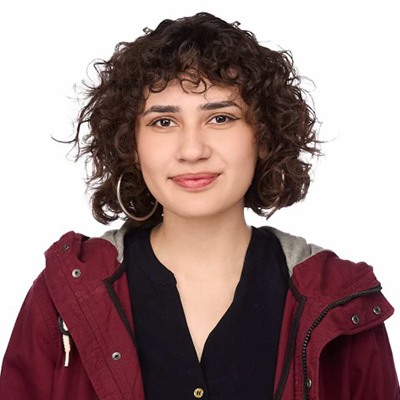 In spring 2023, Mabel Aguilera graduated from SDSU with an M.A. in rhetoric and writing studies with a focus in professional writing. As a technical writer for Rockstar Games, a video game publisher, she handles all requests for writing-intensive projects through Confluence, a Wikipedia-like website for tech companies to store their documentation. The program’s courses on professional writing in different contexts helped set up Aguilera perfectly for a career in technical writing.
In spring 2023, Mabel Aguilera graduated from SDSU with an M.A. in rhetoric and writing studies with a focus in professional writing. As a technical writer for Rockstar Games, a video game publisher, she handles all requests for writing-intensive projects through Confluence, a Wikipedia-like website for tech companies to store their documentation. The program’s courses on professional writing in different contexts helped set up Aguilera perfectly for a career in technical writing.
Reflecting on her time as a graduate student, she names Jennifer Sheppard and Glen McClish as important faculty members throughout her academic journey.
In Sheppard’s classes, she recounts how “visual rhetoric, proposal writing and presenting to stakeholders for the Sage Project were all crucial in the foundation of [her] work.” McClish’s teachings on ancient rhetoric still “ring true today” for Aguilera, who recognizes Ancient Greece’s influence on contemporary rhetoric.
Although Aguilera enjoyed exploring various discourses in rhetoric and developing her skills in professional writing, there was a third reason to pursue the M.A. — how could she make her resume stand out? “Unfortunately for our generation, every employer requires at least a bachelor’s degree to apply and qualify for an entry-level position,” she points out. By having an M.A., she demonstrates to potential employers that she has the “ability to write well.” Accordingly, she supports her co-workers who aren’t experienced in conveying technical information to general audiences. “Engineers hate to write!” she quips.
Equipped with valuable skills learned in RWS, she put them to practice when given the opportunity. Her introduction to technical writing began with interning for Spectrum, a telecommunications company, to “learn the craft.” She was also a contractor for the San Diego Zoo, updating their documentation, as she finished the graduate program. Upon graduation, she accepted her first full-time position at Spectrum. Eventually, Aguilera made the jump to Rockstar Games to remain close to her family and friends in the San Diego area.
At Rockstar Games, she recently completed a long-term project for Confluence by making a homepage for a department of 22 teams. “It encompasses all their ongoing, finished, and archived projects, as well as a list of contacts for each team,” she explains. Aguilera worked on this project for several months, interviewing and researching extensively to ensure the homepage was accessible for “hundreds of users” in their everyday work. Mulling over the impact of her work, she says, “It makes me feel good to know that my work is being helpful and serving its original purpose.”
Writing is still an important part of Aguilera’s life outside of work. She started a writing club to keep her writer friends connected and to share individual pieces amongst each other. For her, it’s important to support creative writing as an outlet. “To not let ourselves forget why we went into this field to begin with,” she remarks.
Alumni Profile: Greg Papania
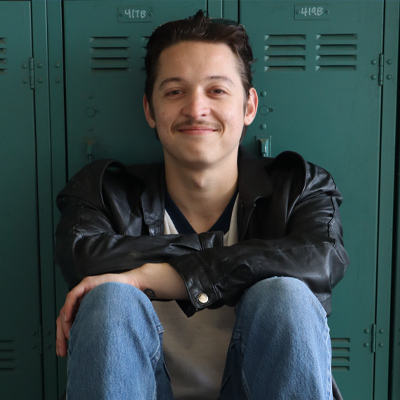 Greg Papania, who received a B.A. in rhetoric and writing, currently works as a remote writing tutor for Tutor.com, an online tutoring company. His degree allows him to maintain his career in academia — his “favorite type of career.” Having always loved researching, reading, and writing, Papania jokes that he went a “bit crazy” post-graduation. “But now that I tutor students in the academic field, I feel much more fulfilled in my need to still feel involved in the education field,” he explains. He works with students on all kinds of writing, but essay writing is typically the most common.
Greg Papania, who received a B.A. in rhetoric and writing, currently works as a remote writing tutor for Tutor.com, an online tutoring company. His degree allows him to maintain his career in academia — his “favorite type of career.” Having always loved researching, reading, and writing, Papania jokes that he went a “bit crazy” post-graduation. “But now that I tutor students in the academic field, I feel much more fulfilled in my need to still feel involved in the education field,” he explains. He works with students on all kinds of writing, but essay writing is typically the most common.
Even so, majoring in RWS was not his first plan. He was originally working toward a degree in chemistry, but, before entering his third year of college, he made the difficult decision to switch majors.
“I was initially nervous, but that leap of faith made the rest of my college experience worth it,” Papania reveals. “Writing gives me life, and I don't know who I would be without it.”
He remembers his time in the program fondly, learning how to “perceive ideas and concepts under a different lens” and rethinking his “life under a different perspective.” When asked if there were any professors who made an impact on him, Consuelo Salas naturally came to mind. Salas was the “best lecturer” he learned from at SDSU since her classes helped him “fall in love with intellectuality itself.” Papania felt she always asked the “right questions to keep the class engaged” and “made every class session feel important.” When he entered her classroom, Papania recalls having never felt as important in his life than how he felt walking into her classes.
Papania completed one of his most interesting writing projects in Salas’ RWS 410: Cultural Rhetorics class, a paper on queer rhetoric and intersectionality. He explains his reasoning for choosing this topic: “My interest in my own community led me to dive deeper into the intricacies of the LGBTQ+ community, and more importantly, the messages, symbols, and people who make up the very foundation and culture of this diverse community. I wanted to shine a light on the beauty in which it shows, so this was an honor to research and discuss.”
The decision to make a “complete 180” from STEM to RWS proved to be the right choice for Papania. “I genuinely wouldn’t be who I am today without going through the RWS major,” he says. Although his career involves writing on a daily basis, Papania continues to enjoy writing in a personal sense. He makes sure to write at least once a week as the “act of writing itself” is akin to “[feeding his] soul.”
Meet the Editors
Amy Fong
 Amy Fong is a second-year graduate student for the M.A. program in rhetoric and writing studies. When she was working toward a B.A. in English here at San Diego State University, her undergraduate advisor recommended trying her hand at the Certificate in Professional Writing program offered by the RWS department. During this period, she developed further interest in what rhetorics could offer her professionally and personally. After finishing her B.A., she decided to apply for the M.A. program with a focus in professional writing to help develop her career in technical writing. Fong is grateful for the opportunity to support the RWS Department and work alongside Althea to bring the fall 2024 newsletter to fruition.
Amy Fong is a second-year graduate student for the M.A. program in rhetoric and writing studies. When she was working toward a B.A. in English here at San Diego State University, her undergraduate advisor recommended trying her hand at the Certificate in Professional Writing program offered by the RWS department. During this period, she developed further interest in what rhetorics could offer her professionally and personally. After finishing her B.A., she decided to apply for the M.A. program with a focus in professional writing to help develop her career in technical writing. Fong is grateful for the opportunity to support the RWS Department and work alongside Althea to bring the fall 2024 newsletter to fruition.
Althea Millman
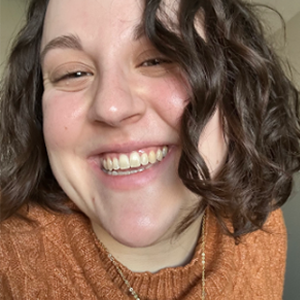 Althea Millman is a rhetoric and writing studies major in the final year of her undergraduate studies. As co-editor of the fall 2024 newsletter, she interviewed fellow students and faculty in the department and wrote profiles highlighting their experiences. Alongside writing duties, she enjoyed brainstorming and collecting materials for department outreach. Millman has thoroughly appreciated her experiences in the program, deeply valuing its connections and community. She thanks Amy Fong for her kind and supportive collaboration in editing this semester’s newsletter. Millman is grateful to Kathryn Valentine for ultimately trusting her to represent RWS.
Althea Millman is a rhetoric and writing studies major in the final year of her undergraduate studies. As co-editor of the fall 2024 newsletter, she interviewed fellow students and faculty in the department and wrote profiles highlighting their experiences. Alongside writing duties, she enjoyed brainstorming and collecting materials for department outreach. Millman has thoroughly appreciated her experiences in the program, deeply valuing its connections and community. She thanks Amy Fong for her kind and supportive collaboration in editing this semester’s newsletter. Millman is grateful to Kathryn Valentine for ultimately trusting her to represent RWS.
Chair's Letter

I am happy to begin this letter by congratulating the RWS Class of 2024: Congratulations graduates! The department recently honored our graduates on Friday, May 10, at our 10th RWS graduation ceremony for undergraduate students and our 20th ceremony for graduate students. We look forward to many such occasions to come.
As I look back on my first academic year as department chair, I want to thank the students, faculty, and staff who all contribute to a vibrant learning community in our department. I also want to say thank you to two faculty members who have retired this past academic year: Richard Boyd and Cali Linfor. Boyd joined the faculty at SDSU in 1996 and ended his participation in the early retirement program after December 2023. While Boyd taught many courses and took on many roles in the department during that time, his contributions to preparing graduate students to become teachers of writing in RWS 609 stand out to me. Linfor also joined the department in 1996 when she taught courses as a graduate student and then continued as a lecturer. Linfor taught numerous writing courses and also contributed to the efforts of the department and university to develop inclusive and equitable courses and programs. You can read more about Linfor’s work in the fall 2022 newsletter.
This newsletter features two of our current students and now graduates, Richard Mattison and Mariel Geronimo. It also features two alumni of our undergraduate and graduate programs, Hannah Willis (B.A., 2017) and Matt Breece (M.A., 2015), and one current faculty member, Sydney Sullivan. We also say goodbye and thank you to our wonderful newsletter editors, Celia Fisher and Noelle Higgins, part of the graduating class of 2024.
While the end of the academic year brings many goodbyes, it also brings many new opportunities as our newest graduates find their way as rhetors and writers and as we all continue to explore rhetoric as a form of expression and art. I wish our students, alumni, faculty, and staff well in those future opportunities and explorations.
Kathryn Valentine,
RWS Department Chair
RWS Writing Mentors: Sydney Sullivan
 The RWS department takes pride in the many ways it supports writers on campus – this especially rings true for Sydney Sullivan, as she details her involvement in the Writing Mentors Program as well as her overall experience as part of the RWS faculty. After finishing her qualifying exams for her Ph.D. in education in April 2023, Sydney began working for the Rhetoric and Writing Studies department later that year. Sydney enthusiastically recalls her discovery of the program: “I have a Designated Emphasis in Writing Rhetoric and Composition Studies so when I saw there was a department specifically dedicated to ‘rhetoric’ I thought ‘How cool?!’ It’s something unique I don’t believe other programs have to offer, and in my short time here I have already seen how impactful it can be to have rhetoric at the center of a curriculum.” Since beginning her work at SDSU, Sullivan has loved teaching courses such as RWS 290, Business Writing, along with being involved in the Writing Mentors Program on campus.
The RWS department takes pride in the many ways it supports writers on campus – this especially rings true for Sydney Sullivan, as she details her involvement in the Writing Mentors Program as well as her overall experience as part of the RWS faculty. After finishing her qualifying exams for her Ph.D. in education in April 2023, Sydney began working for the Rhetoric and Writing Studies department later that year. Sydney enthusiastically recalls her discovery of the program: “I have a Designated Emphasis in Writing Rhetoric and Composition Studies so when I saw there was a department specifically dedicated to ‘rhetoric’ I thought ‘How cool?!’ It’s something unique I don’t believe other programs have to offer, and in my short time here I have already seen how impactful it can be to have rhetoric at the center of a curriculum.” Since beginning her work at SDSU, Sullivan has loved teaching courses such as RWS 290, Business Writing, along with being involved in the Writing Mentors Program on campus.
Sullivan is the co-coordinator for the Writing Mentors Program and she works alongside Lea Baker to ensure that the program is the best that it can be. Sullivan explains, “Together, we work to keep the program running smoothly and foster relationships between mentors, mentees, and instructors.” The Writing Mentors Program is “an embedded tutoring program that hires undergraduate and graduate students for our rhetoric and linguistic courses.” Through this program, students are able to grow in their writing and linguistic skills, and student workers are able to grow in their consulting and mentoring skills. When discussing the importance of the program, Sullivan says, “I think the ‘collaborative’ component is what makes this program so special because students working together can be such a transformative experience as they’re working through their writing process. Kevin Roozen writes about how ‘writing is a social and rhetorical activity’ and I think this program truly embodies that.”
For those looking to get involved in the Writing Mentors Program, Sullivan offers this invitation: “Come and talk to us! Lea Baker and I are always looking for eager undergraduates and graduate students who are interested in being a mentor. We hire people from all different majors and levels of experience, so please come talk to us or send us an email if you are interested.”
Alumni: Matt Breece
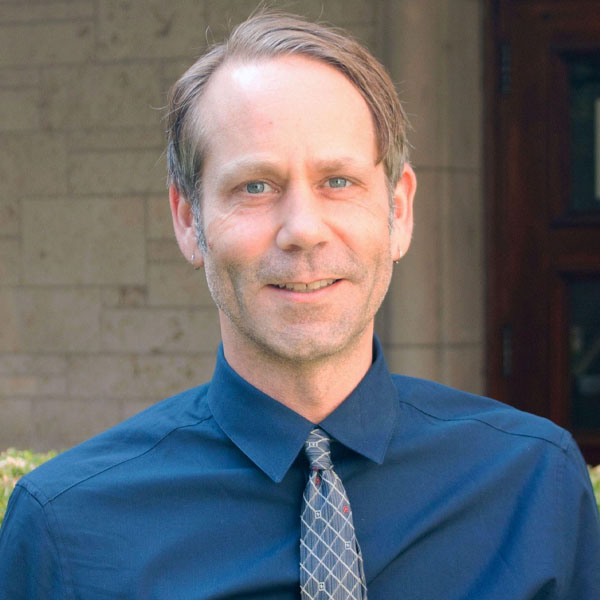 Matt Breece, currently a lecturer in the Writing Program at UC Santa Barbara, describes how earning his M.A. in SDSU's RWS program played a large role in determining his current career path: “The M.A. program at SDSU helped prepare me for my Ph.D. program in rhetoric and writing at UT Austin. It not only prepared me for the application process, but it also prepared me for the type of advanced research and writing expected in a Ph.D. program.” After obtaining his Ph.D., Breece began work as a lecturer and reflects back on his time in the department fondly.
Matt Breece, currently a lecturer in the Writing Program at UC Santa Barbara, describes how earning his M.A. in SDSU's RWS program played a large role in determining his current career path: “The M.A. program at SDSU helped prepare me for my Ph.D. program in rhetoric and writing at UT Austin. It not only prepared me for the application process, but it also prepared me for the type of advanced research and writing expected in a Ph.D. program.” After obtaining his Ph.D., Breece began work as a lecturer and reflects back on his time in the department fondly.
Thinking back on his time in the RWS department, Breece recalls the process of writing his thesis. “Writing my M.A. thesis was the first time I worked on a long, sustained writing and research project,” he says. “It definitely helped me become a better scholar, researcher, and writer. It also helped prepare me for writing my Ph.D. dissertation.” Not only did writing his thesis help him grow as a scholar, but so did the courses and professors that he interacted with. Breece mentions how his favorite course at SDSU was RWS 600, Reading Rhetorically, which was taught by Glen McClish. Breece says, “I really enjoyed practicing a variety of approaches to analyzing texts from evaluating arguments to examining rhetorical strategies to interpreting figures and tropes. It was a great introduction to the breadth and scope of rhetoric.” This foundational course, along with many others, helped Breece discover his passions in the field of writing – ultimately leading to a sense of newfound confidence for which he thanks the department.
Outside of the RWS department, Breece has worked on many interesting writing projects. When asked about one that sticks out in particular, he mentions that the most interesting writing project that he has worked on so far is an article he wrote for Philosophy and Rhetoric titled “Ethical Repetitions: Rhetorical Imitation and/as Algorithmic Judgment.” In this article, he compares classical imitation pedagogy with machine-learning algorithms to examine a rhetorical model for ethical inclusion. With his passions being sparked through the rhetorical foundations and teachings at SDSU, Breece was able to later on find a field that accompanied his interests. Though it is a lot of work, he concludes his interview with the following suggestion for current RWS students and/or those looking to be involved in RWS: “Learn as much as possible and enjoy yourself. The M.A. program is a fantastic opportunity, so get the most out of it.”
Alumni: Hannah Willis
 As a graduate of the RWS B.A. program, Hannah Willis has smoothly transitioned into the workforce using several skills she once learned in the department here at SDSU. Currently, Willis is a senior marketing manager for RedMed, a medical device company where her specialty lies in their SaaS (software as a service) division – this provides “electronic health record software and other software solutions for facilities outside of the hospital.” Essentially, Willis generates leads through marketing campaigns. She also does content creation and explores a variety of channels for her campaigns, while simultaneously collaborating with a copywriter to ensure accuracy across the board. There are several overlaps in terms of tools she learned in RWS – some of which include a compelling argument, accurate messaging, and most importantly, making sure all of the above is catered to the right audience.
As a graduate of the RWS B.A. program, Hannah Willis has smoothly transitioned into the workforce using several skills she once learned in the department here at SDSU. Currently, Willis is a senior marketing manager for RedMed, a medical device company where her specialty lies in their SaaS (software as a service) division – this provides “electronic health record software and other software solutions for facilities outside of the hospital.” Essentially, Willis generates leads through marketing campaigns. She also does content creation and explores a variety of channels for her campaigns, while simultaneously collaborating with a copywriter to ensure accuracy across the board. There are several overlaps in terms of tools she learned in RWS – some of which include a compelling argument, accurate messaging, and most importantly, making sure all of the above is catered to the right audience.
Though it has been a couple years since her graduation, Willis remembers the program as always being small and intimate – this is something that RWS prides itself on as it fosters close relationships with professors and fellow students. Additionally, she always “found the materials to be both interesting and relevant to [her] personal life.” Because of this, she was able to pick up on skills that she would later transfer to her career, and really learned how to understand people in general. For example, although Willis did not have any formal marketing education as her minor was in art, she used her RWS written communication skills to combine her major and minor in a way that was ideal for a career in marketing. She “started out as a marketing copywriter intern while attending SDSU and has worked up to the position [she] is now by using [her] experience and education.”
Willis is thrilled that she has been able to use her skills from RWS in her career today. When asked about her most interesting writing project, she replied that it is her current position that makes her happiest. Willis enjoys writing and working on the marketing campaigns the most as she loves being able to “start with an idea and bring it to life with copy and design, then evaluate the performance to really see what's resonating with our target audience.” Currently happy with where she is in her career and grateful to the department for introducing her to new skillsets, Willis also recognizes that finding a career that is meant for you will take time. Ending her interview with gratitude, Willis offers the following advice for current/future students:
“Your professional career is not always linear. You don’t always stay with one company for a long time. Sometimes, you might have to jump from company to company until you find a position where you feel like you belong. Also, if you feel undervalued, you should listen to your gut and find another opportunity – despite how difficult it might be to leave. There is no such thing as rejection, only redirection.”
Graduate Student: Mariel Geronimo
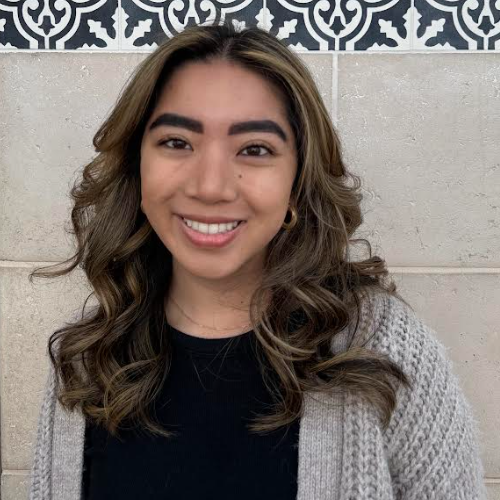 Current RWS graduate student, Mariel Geronimo describes her undergraduate education in philosophy as a beneficial gateway into the work she has been doing in the RWS department. She notes that “while philosophy and rhetoric are different, the ability to think abstractly and critically enabled [her] to understand the core foundations of rhetoric.” The intersection of her education in both philosophy and rhetoric is something that has defined her career not only as a student, but also when it comes to her professional plans for the future. After graduating with her B.A. in philosophy in 2020 and with the goal of eventually attending law school in mind, Geronimo was encouraged to pursue different graduate programs. Geronimo recalls applying “to the RWS M.A. program after seeing they offered a specialization in professional and technical writing.” Ultimately, she decided that earning her M.A. in rhetoric and writing studies was the right path for her, and has been preparing for law school ever since.
Current RWS graduate student, Mariel Geronimo describes her undergraduate education in philosophy as a beneficial gateway into the work she has been doing in the RWS department. She notes that “while philosophy and rhetoric are different, the ability to think abstractly and critically enabled [her] to understand the core foundations of rhetoric.” The intersection of her education in both philosophy and rhetoric is something that has defined her career not only as a student, but also when it comes to her professional plans for the future. After graduating with her B.A. in philosophy in 2020 and with the goal of eventually attending law school in mind, Geronimo was encouraged to pursue different graduate programs. Geronimo recalls applying “to the RWS M.A. program after seeing they offered a specialization in professional and technical writing.” Ultimately, she decided that earning her M.A. in rhetoric and writing studies was the right path for her, and has been preparing for law school ever since.
Geronimo reflects on a few courses and professors that impacted her greatly throughout her RWS experience. “An inspirational course I took is RWS 504, Advanced Professional Writing, with Jenny Sheppard,” she says. “I enjoyed this class because it taught me the practical elements of rhetoric. We had the experience of working with a nonprofit organization to help them find ways to build their mission. The application of analysis, research, and persuasion to develop our ideas allowed me to understand what rhetoric is beyond the classroom; rhetoric gives us the opportunity to utilize what we have learned in the classroom to make a difference in our community.
“My favorite course is RWS 601A with Glen McClish. What I enjoyed the most about this course was seeing the intersection between the texts from this class and law. The dense readings and the writing assignments in this class have elevated my persuasive skills which I know will be useful for law school. The writing assignments in this class taught me how to communicate my point effectively from the preparation and research I had to do.”
When discussing her thesis, Geronimo was eager to describe the work that she has been doing. “For my thesis, I analyze three landmark United States Supreme Court cases –Brown v. Board of Education of Topeka, Lau v. Nichols, and Regents of the University of California v. Bakke – to evaluate kairos and narrative through the lens of racial discrimination in education. Her thesis work will directly inform her next step: attending law school in the fall. Although she has not yet decided where she will attend, Geronimo is grateful for the RWS department and for all of the support she has been given. She urges current students to “choose a career path that you are genuinely interested in and passionate about because your determination for it will outweigh the challenges that may come your way.”
Undergraduate Student: Richard Mattison
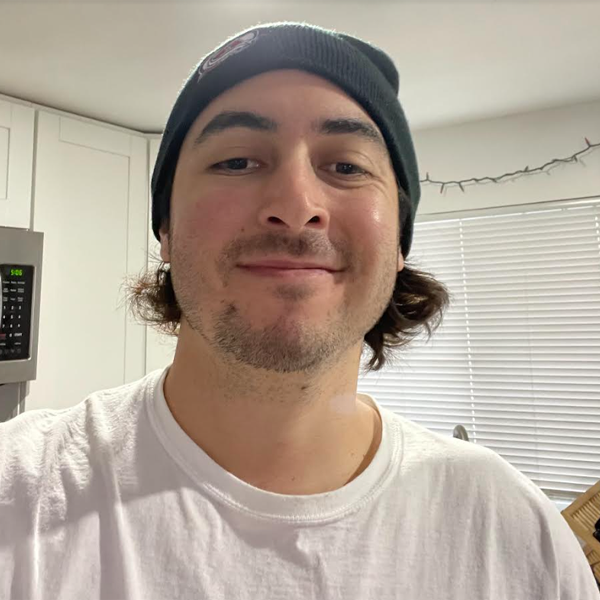 As a current senior in both rhetoric and writing studies and business administration, Richard Mattison could not be more grateful for his time here at SDSU as it has helped him “develop a comprehensive perspective on rhetoric,” and expand on skill sets that differ from a traditional English major. When asked about how he first discovered the RWS program, Mattison remembers feeling curious about a major that could so greatly differ from a typical English course; however, after taking his first class after transferring, he was hooked. Due to the wide range of coursework that RWS offers, Richard was able to pair his business administration major with courses in professional writing, business writing, and even writing for nonprofit organizations – something that he can see himself partaking in throughout his future as he enters the workforce.
As a current senior in both rhetoric and writing studies and business administration, Richard Mattison could not be more grateful for his time here at SDSU as it has helped him “develop a comprehensive perspective on rhetoric,” and expand on skill sets that differ from a traditional English major. When asked about how he first discovered the RWS program, Mattison remembers feeling curious about a major that could so greatly differ from a typical English course; however, after taking his first class after transferring, he was hooked. Due to the wide range of coursework that RWS offers, Richard was able to pair his business administration major with courses in professional writing, business writing, and even writing for nonprofit organizations – something that he can see himself partaking in throughout his future as he enters the workforce.
Though he has enjoyed many courses here at SDSU, the one that stands out most to him was RWS 543, Rhetoric of Visual Composing, with Jenny Sheppard. Not only was it “fascinating to learn about rhetoric in non-writing settings,” but “[he] had this class with all of [his] friends! [They] all grew closer in this class and had some good times. This combination made it an interesting, fun, and wholesome class to be a part of!” Additionally, pairing these visual skills with key concepts of rhetoric like tailoring your writing to certain audiences once again reminds Mattison that “there’s no one-size-fits all approach to writing. Each project is unique and requires time to consider the audience, goal, and overall objective. It often takes time and effort to conduct this step, but it will often be the difference between average work and excellent work that stands out from the rest.” Mattison has been able to experience this first hand through applying these skills in projects including academic writing, proposal writing, resume and cover letter writing, research projects, and even grant proposal writing – once again giving him confidence that he will continue to use these skills after graduation.
With graduation coming up, he is equally thrilled yet filled with a sense of bittersweetness as he departs from SDSU. While he will miss his professors and classmates, he feels prepared to take on new challenges with his several career goals. Eventually, Mattison hopes to be a successful entrepreneur and “start businesses that have a positive impact on people and the planet.” Additionally, he mentions that no matter the type of business, “writing skills are critical when growing a company.” Though his goals are centered around the idea of entrepreneurship, he hopes to be able to explore the creative side of writing as well as he “loves the storytelling element of writing.”
Mattison expresses his gratitude for everything the RWS program has taught him. Because of teachers and lessons learned along the way, he has been able to hold an internship with an international business organization for two years, developing both friendships and professional relationships, and overall learning how to apply his critical writing and communication skills in areas both in and out of the classroom.
Farewell to our Editors
Celia Fisher and Noelle Higgins
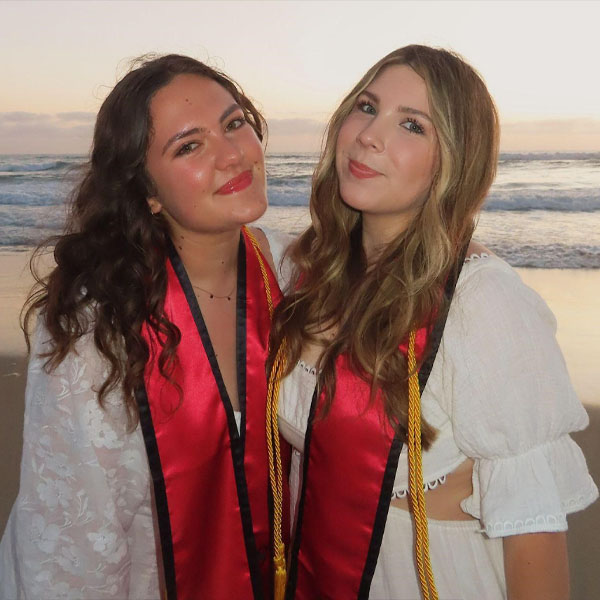
As graduation approaches, Celia Fisher and Noelle Higgins reflect on their time as the rhetoric and writing studies newsletter editors. Since 2022, the pair have been able to edit five issues while continuing their full-time student status, involvements on campus, and even studying abroad for a semester. The following piece is their sincerest form of gratitude to the RWS department and San Diego State University as a whole.
“The two of us were newly admitted to SDSU when we were hired for this role and had no idea what to expect after coming to college in a post-COVID era. We were both RWS majors looking for a way to become more involved in the department when we got an email asking for undergraduate students to apply for this newsletter position. Though we were equally timid, we both applied, and were surprised when we both got the role as we thought it would be a one person job. Little did we know that because Glen McClish chose to hire the both of us, we would gain invaluable experience in the field of writing, but also gain each other as best friends for life.
“Throughout the course of our time here at SDSU, we have been fortunate enough to learn how to greatly improve our composition skills, effectively analyze texts, and overall focus on bettering our journalistic expertise. Through not only the teachings of the RWS department, but because of the direct supervision of Glen McClish and KathrynValentine, we feel as though the development of our professional skill sets have directly correlated to how we were able to grow into ourselves as writers, students, and soon to be graduates. The two of us agree that if we were to see our freshman-year-selves right now, they would be incredibly proud. As two students who used to be scared to raise their hand in the classroom, we feel that RWS has given us the tools we needed to fully find our voices.
“As we sit in the Love Library writing this as our final piece for the newsletter, a feeling of nostalgia has come over us. We feel so lucky to have had this position for so long, and to have enjoyed it enough to wish that we could keep writing even after graduation; however, we know that it will be in good hands for years to come. Thank you to every professor, faculty member, alumni, and fellow classmate that was a pleasure to interview and write about, and thank you to SDSU for constant encouragement and support. Farewell RWS and SDSU!”
Chair's Note
 As I reflect on the stories of fall 2023 in this newsletter and on my first semester as department chair, I am reminded again of rhetoric and writing as discovery, as practices and products of coming to know the self, each other, and the larger communities in which we belong. I am also reminded again of how rhetoric is a means of coming to understand one’s voice as discussed by Emily Tablak and one’s dignity as talked about by Issac Castillo. In their discussions of the study and practice of writing pedagogy, I rediscover the shared values that many of us center in our teaching and learning such as the design of curriculum focused on meaningfulness as explored by Nathan Nugent and the attention to students’ vulnerability when they read and write in academic spaces as described by Chelsea Kerford. Last, I see rhetoric and writing as processes of discovery in the exploration of Caroyln Gubala and Kristen Fogle as they describe their journeys through academia, including revisiting old ideas in new contexts as with Carolyn, and across workplaces, including finding writing opportunities as with Kristen.
As I reflect on the stories of fall 2023 in this newsletter and on my first semester as department chair, I am reminded again of rhetoric and writing as discovery, as practices and products of coming to know the self, each other, and the larger communities in which we belong. I am also reminded again of how rhetoric is a means of coming to understand one’s voice as discussed by Emily Tablak and one’s dignity as talked about by Issac Castillo. In their discussions of the study and practice of writing pedagogy, I rediscover the shared values that many of us center in our teaching and learning such as the design of curriculum focused on meaningfulness as explored by Nathan Nugent and the attention to students’ vulnerability when they read and write in academic spaces as described by Chelsea Kerford. Last, I see rhetoric and writing as processes of discovery in the exploration of Caroyln Gubala and Kristen Fogle as they describe their journeys through academia, including revisiting old ideas in new contexts as with Carolyn, and across workplaces, including finding writing opportunities as with Kristen.
I also reflect on my own process of discovery as the department thanked Glen McClish for his many years of service as chair and as I began in the role of chair in August 2023. I discovered that Glen continues to be a valuable colleague as he works for the department through the early retirement program and continues to offer guidance to me and others. As a sign of our change in positions, Glen now has my faculty office while I inhabit the chair’s office – and a beautiful view of San Diego. From this vantage point, I reflect on how rhetoric and writing happen on campus, and all the many people in our department who support such work, but also how and where rhetoric and writing may be happening beyond campus and the many ways our alumni and those in our communities engage in this work here in San Diego and beyond. I hope you enjoy reading about some of those ways here.
Kathryn Valentine,
RWS Department Chair
Students: Nathan Nugent
 Nathan Nugent is a current graduate student in the Department of Rhetoric and Writing Studies at SDSU. After earning his B.A. in journalism from San Francisco State University, Nugent enthusiastically describes his experience discovering the RWS M.A. program: “I had been thinking about getting into a master’s program for a few years while I was teaching high school English between 2015–2022, but I knew I didn’t want to get an M.A. in education. The RWS program at SDSU came up on a Google search looking for M.A. writing programs in the CSU system, and I was directed to a one-page brochure for the program that looked very appealing with the emphasis on rhetoric very much in line with my interests. I also saw that there was a teaching of writing specialization pathway within the major along with an opportunity to work on a thesis option for graduation – while living in San Diego! It became my dream.” Nugent continues on to describe how much he has enjoyed his learning so far throughout the department, mentioning how inspiring it was to discover “how rhetorical study is rooted in such a rich teaching tradition stretching back to the ancient world.”
Nathan Nugent is a current graduate student in the Department of Rhetoric and Writing Studies at SDSU. After earning his B.A. in journalism from San Francisco State University, Nugent enthusiastically describes his experience discovering the RWS M.A. program: “I had been thinking about getting into a master’s program for a few years while I was teaching high school English between 2015–2022, but I knew I didn’t want to get an M.A. in education. The RWS program at SDSU came up on a Google search looking for M.A. writing programs in the CSU system, and I was directed to a one-page brochure for the program that looked very appealing with the emphasis on rhetoric very much in line with my interests. I also saw that there was a teaching of writing specialization pathway within the major along with an opportunity to work on a thesis option for graduation – while living in San Diego! It became my dream.” Nugent continues on to describe how much he has enjoyed his learning so far throughout the department, mentioning how inspiring it was to discover “how rhetorical study is rooted in such a rich teaching tradition stretching back to the ancient world.”
When discussing the most interesting writing project he has worked on so far, Nugent describes a paper he wrote during his first semester in the program. “I crafted a seminar paper for RWS 609, with Professor Richard Boyd titled ‘Consulting Student Leaders: Cogenerative Dialogue in Practice and Theory.’ In the piece, I use concepts from critical pedagogy to reflect on my experiences conferencing with high school students in ‘leader lunch’ meetings I created during and after the COVID era of online instruction.” He mentions that he would like to continue his research on this project based on his recent experiences as a TA for RWS 100 and 200 classes. Along with that, Nugent mentions the most inspirational course that he has interacted with so far as a graduate student. He states, “RWS 640, Research Methods with Professor Kathryn Valentine has been my favorite and most significant course in the M.A. program so far. I liked how we took the course in our second semester of the program to figure out what kind of research we wanted to explore. Professor Valentine’s course sequence also helped me think about how to apply concepts in qualitative research and rhetorical criticism, and my abilities as a writer grew by taking on new and challenging genres of composition.” Nugent explains how engaging the coursework is overall, and discusses the incredible community that is established in the department.
Nugent describes an especially notable moment during his time so far in the RWS department. “This past summer of 2023, I attended the Computers and Writing Conference, at UC Davis. At the event, I was able to present the preliminary ideas from my research proposal in RWS 640 at a roundtable with professors and fellow graduate students, and I got some meaningful feedback. I was also able to join Professor Edwards and Professor Jenny Sheppard, who were also in attendance, in sessions ranging from AI in writing instruction, digital tools in reading and scholarly writing production, and the ‘Wayfinding Project,’ a large-scale qualitative study on what college alumni remember most fondly about their writing experiences as undergraduates.” He mentions how fortunate he was to have been able to attend this conference and how much he learned from this experience. Along with that, Nugent works as the Graduate Teaching Assistant in the lower-division writing program. With this position, Nugent mentions that he has “had the honor of designing common curriculum that integrates the department’s new student learning outcome which includes a focus on “rhetorics of global and structurally marginalized communities.”
As for his work as a graduate student and beyond, Nugent is currently working on his thesis. He states, “Drawing on the research methods I’ve practiced in RWS 512 and RWS 640, I am proposing a basic qualitative study for my thesis prospectus. The purpose of the research is to discover how teachers of first-year college writing courses design meaningful writing prompts. I’m most interested in using replicable interview methods to gather data on how teachers think about writing assignments, and hopefully I can arrive at a few pedagogical recommendations.” Nugent is incredibly passionate about his work within the department and describes each one of his experiences and opportunities with such gratitude. Lastly, Nugent mentions his aspirations for after he obtains his M.A. “I plan on pursuing full-time work as a lecturer in rhetoric and composition for at least two years to gain more experience teaching in higher education. I am also considering applying for Ph.D. programs later in my life, but at the moment, I want to keep working on writing projects for potential publication and doing as much as I can with students in the classroom.”
Student: Emily Tablak
 Emily Tablak is a dedicated individual who is in her fourth year as an RWS major at San Diego State University. As the CAL representative for SPLICE, the journal of undergraduate scholarship, Emily mentions that her main role is to “work to recruit and convince people to submit their work. I also employ visual rhetoric skills since at the moment I am co-running the social media pages.” This, in combination with her involvement in the rhetoric and writing studies major, prepares her for a whole field of job opportunities by sharpening her writing skills. Though she is nearing the end of her time at SDSU, Emily is grateful that she has been able to “find confidence” in herself and her voice.
Emily Tablak is a dedicated individual who is in her fourth year as an RWS major at San Diego State University. As the CAL representative for SPLICE, the journal of undergraduate scholarship, Emily mentions that her main role is to “work to recruit and convince people to submit their work. I also employ visual rhetoric skills since at the moment I am co-running the social media pages.” This, in combination with her involvement in the rhetoric and writing studies major, prepares her for a whole field of job opportunities by sharpening her writing skills. Though she is nearing the end of her time at SDSU, Emily is grateful that she has been able to “find confidence” in herself and her voice.
When asked about her involvement in the program, she mentions that a main reason for joining the department was because of a push from her RWS 200 professor who was impressed with her work. After doing so, she soon discovered that the reason rhetoric stood out to her was because “it felt much more personal. The projects I have created for my classes have been an amazing outlet for me. I think rhetoric gives students a way to voice opinions and talk about subjects they might not otherwise get the opportunity to discuss in other settings.”
Emily once again thanks the professors in the program as they are a critical part of why she stayed so involved in RWS. “They have been very supportive and are always eager to help,” she says. “The classrooms have always felt like safe spaces where students are allowed to voice opinions and concerns.” Due to the seminar style of a lot of RWS classes, creating a comfortable environment is something that the department has nearly perfected.
An example of this is an upper division course, RWS 510: Rhetoric and Culture. Emily mentions that it “opened my eyes to so many different forms of rhetoric and even helped me find my own voice and the ways culture influenced my own forms of communication. This class made it very apparent that there are so many diverse ways of communicating with others, and we should embrace that everywhere, including the classroom.” She wishes that more people understood that RWS is “so much more than just a GenEd and has the potential (whether it is your major or minor) to build your communication skills.”
Not only has Emily found confidence in herself in class, but while doing so, she learned the value of effective communication in both social and professional settings. With this, she hopes that as she departs from SDSU, students give the unique program a chance and that they realize it is “so much more than just writing essays and learning about old Greek philosophers. This program is a way for students to discover their own voice and learn the ways to effectively communicate their opinions and beliefs.”
Alumni: Carolyn Gubala
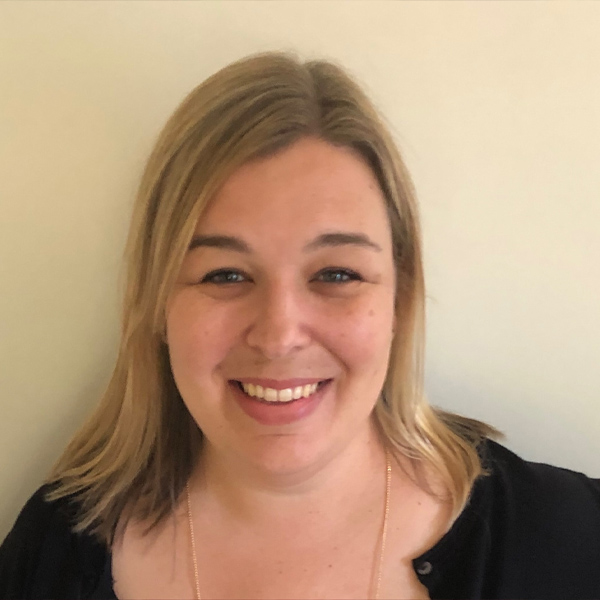 Currently working in the University Writing Program at the University of California Davis, Carolyn Gubala enthusiastically shares what her experience was like obtaining her M.A. from the Department of Rhetoric and Writing Studies at San Diego State University. Gubala describes the original appeal of the RWS program for her when she first discovered it: “At the time, I was working full-time as a managing editor for a small publishing company in San Diego. Originally, I wanted to pursue an M.A. in RWS so that I could teach at the community college level; however, being engaged in graduate level discussions with classmates and professors inspired me to pursue a Ph.D.” Gubala goes on to explain the supportive and positively challenging nature of the program, describing her peers and the faculty she interacted with to have created a strong “sense of community” that has been “developed through meeting like-minded individuals.” She also says that her experience within the department set her up for success further on in her rhetorical studies. “My M.A. in RWS from SDSU provided a rich foundation in rhetoric and composition. I entered my Ph.D. program with a solid understanding of rhetorical theory, classical rhetoric, and teaching approaches.”
Currently working in the University Writing Program at the University of California Davis, Carolyn Gubala enthusiastically shares what her experience was like obtaining her M.A. from the Department of Rhetoric and Writing Studies at San Diego State University. Gubala describes the original appeal of the RWS program for her when she first discovered it: “At the time, I was working full-time as a managing editor for a small publishing company in San Diego. Originally, I wanted to pursue an M.A. in RWS so that I could teach at the community college level; however, being engaged in graduate level discussions with classmates and professors inspired me to pursue a Ph.D.” Gubala goes on to explain the supportive and positively challenging nature of the program, describing her peers and the faculty she interacted with to have created a strong “sense of community” that has been “developed through meeting like-minded individuals.” She also says that her experience within the department set her up for success further on in her rhetorical studies. “My M.A. in RWS from SDSU provided a rich foundation in rhetoric and composition. I entered my Ph.D. program with a solid understanding of rhetorical theory, classical rhetoric, and teaching approaches.”
When discussing her experience writing her thesis, Gubala mentions that she is revisiting this topic and expanding on her original work. “I wrote a thesis on using ancient rhetoric to teach professional writing. Looking back, I can see that I lacked enough experience in academia to properly articulate this argument. However, I have recently returned to the ideas behind this project. Specifically, I have recently started a project with a colleague that suggests using the progymnasmata and classical interpretation of imitation to teach writing instructors.” Gubala is incredibly passionate about her work, and looks forward to continuing her conversation on this topic that began within the department.
Along with revisiting the ideas from her thesis, Gubala continues to further her research on many topics of conversation within the field. Specifically, she is currently working on a book about teaching the technical professional communication (TPC) service course with some colleagues. In regard to this course, Gubala states, “The service course refers to business writing, health science writing, and writing for engineers. Our goal is to improve pedagogical practices for teaching TPC service courses using student data, instructor feedback, and interviews with teaching faculty and program administrators. The quantitative and qualitative data collected will be analyzed to offer suggestions on improving pedagogical practices such as outcome integration, assignment design, and feedback.”
At the University of California Davis, Gubala brilliantly implements her rhetorical pedagogical background into her work. When discussing her work, she states, “I primarily teach editing, business writing, technical writing, and advanced composition. As part of this position, I also have an administrative role where I serve as the assistant director of online writing instruction.” Gubala looks back at her time in the master’s program with fondness, and reflects positively on both the courses she took and the faculty in the department — encouraging students today to get involved and make the most of their time here.
Alumni: Kristen Fogle
 Kristen Fogle is an alumna of the RWS master’s program who now focuses her time on being the executive director of the literary nonprofit, San Diego Writers, Ink. After graduating from SDSU, Fogle has focused on jobs in several different areas of expertise, though all still pertaining to composition. She has worked at Point Loma Nazarene University, Armed Services Arts Partnership, Wounded Warriors Project, La Jolla Playhouse, and Coronado School of the Arts. Fogle says, “At PLNU I am teaching undergrad writing and rhetoric and for the others I teach a variety of things — playwriting, creative writing, whatever type of writing someone wants me to teach!” Grateful for her time at SDSU, she reflects on the uniqueness of the RWS program as it “prepared me to teach at the college level and, maybe most importantly, instilled a confidence in me that I could work at a literary center.”
Kristen Fogle is an alumna of the RWS master’s program who now focuses her time on being the executive director of the literary nonprofit, San Diego Writers, Ink. After graduating from SDSU, Fogle has focused on jobs in several different areas of expertise, though all still pertaining to composition. She has worked at Point Loma Nazarene University, Armed Services Arts Partnership, Wounded Warriors Project, La Jolla Playhouse, and Coronado School of the Arts. Fogle says, “At PLNU I am teaching undergrad writing and rhetoric and for the others I teach a variety of things — playwriting, creative writing, whatever type of writing someone wants me to teach!” Grateful for her time at SDSU, she reflects on the uniqueness of the RWS program as it “prepared me to teach at the college level and, maybe most importantly, instilled a confidence in me that I could work at a literary center.”
While enrolled at SDSU, Fogle was met with a number of opportunities to grow her career. One of which was when she served as the vice president of the Graduate Student Association. While she was helping others and offering resources to students alike, she found that she was making connections and finally excelling at something she was passionate about: teaching and tutoring. However, this path was not always on Fogle’s mind. Through a technical writing course she took, she scored an internship with Hewlett-Packard. While “HP was great in a lot of ways,” says Fogle, “I just didn’t enjoy technical writing. I stuck with it for three or four months, and despite that they offered to bump my pay, I just knew I needed a job that was a bit more creative. I’m proud of myself that I said no, simply having a good job is not enough for me.” Fogle mentions that this lesson of being able to “try new things, but don’t be afraid to call it quits if you don’t like what you’re doing,” was something that she learned in the RWS department, and it has stuck with her for years.
Despite her love for writing in the professional world, Fogle also enjoys bringing rhetoric into her personal life. With a five-year-old at home, Fogle discusses how much the two enjoy reading together. “We also spend a great deal of time dissecting the characters, looking at symbolism… I ask a lot of questions. I guess the takeaway is, rhetoric will help you parent.” Fogle jokes at this remarking, “Perhaps I should make t-shirts!”
At the end of the day, Fogle couldn’t be more grateful for her time at SDSU as it has sharpened her career in ways she didn’t think possible. When asked about her personal philosophy on the importance of rhetoric, Fogle ends with the following statement:
“For me rhetoric offers a set of tools to peel away layers, peek behind the veil at something — a slogan, an essay, architecture — and make sense of it in a new, and richer, way. As a culture, with ‘truth’ being delivered faster than ever and often by way of an algorithm, I believe it’s crucial for us to take an active interest in to looking deeper into who is communicating what messages and why.”
Faculty: Chelsea Kerford
 After starting out as a grad student in the RWS department here at SDSU, Chelsea Kerford began working as a lecturer in fall of 2017. Now, coming up on her seventh year of teaching, she reflects on her mother as an inspiration: “I used to go to class with her when I was little and watch her teach ESL.” This was a formative experience for Kerford, as it was something that she kept in mind while on her journey to find a career she loved; though at the time she was venturing into the field of publishing. After giving publishing a try and ultimately deciding it wasn’t for her, she was reminded of another possibility when a teaching opportunity “fell into her lap.” Before she knew it, a community college needed an instructor to teach a GE writing course, and just like that, Chelsea immersed herself in a field that was familiar from her childhood experiences with her mother.
After starting out as a grad student in the RWS department here at SDSU, Chelsea Kerford began working as a lecturer in fall of 2017. Now, coming up on her seventh year of teaching, she reflects on her mother as an inspiration: “I used to go to class with her when I was little and watch her teach ESL.” This was a formative experience for Kerford, as it was something that she kept in mind while on her journey to find a career she loved; though at the time she was venturing into the field of publishing. After giving publishing a try and ultimately deciding it wasn’t for her, she was reminded of another possibility when a teaching opportunity “fell into her lap.” Before she knew it, a community college needed an instructor to teach a GE writing course, and just like that, Chelsea immersed herself in a field that was familiar from her childhood experiences with her mother.
During this experience though, she was faced with several challenges. She was instructing “non-traditional students, many of whom were recently incarcerated or formerly (or currently) houseless, and many of them were neurodiverse.” Kerford expresses her gratitude for this experience, but in the moment she remembers feeling overwhelmed as it was “a pretty difficult job for a new teacher.” However, this experience is what made her want to go back to get her master’s as she “fell in love with teaching.”
Now, since Kerford found her passion, she is able to focus her research on something important to her: identity. Kerford explains that being biracial is something that has been both interesting and confusing for her. Because of this, she focuses on how to express vulnerability when it comes to writing as well as teaching. Another reason for continuing her studying and teaching of rhetoric was due to her realization that “there are so many pieces of everyday life that become easier and more accessible if you have at least a basic understanding of rhetoric/rhetorical principles.”
While Kerford may love the subject that she teaches, she admits that the reason she has stuck around so long is because of the students. She talks about how getting to know their personalities while helping them improve their writing skills is not only rewarding, but also “makes [her] classes so much richer,” and that she is “constantly learning from them, which is so fun.” Seeing the students’ personalities shine was something reflected in her recent RWS 305W class. Kerford explains that because of the unique flexibility of the course, she got to see students’ creativity flourish. From assignments like blog posts via Adobe Express, students had the option to practice pragmatic rhetorical skills in addition to extensive creative freedom in a less formal environment. Overall, Kerford is always striving to better the education of her students, and hopes that she can allow them to feel comfortable in an academic environment that can be quite intimidating.
Staff: Isaac Castillo
 Isaac Castillo has been working at San Diego State University since 2020 and has recently begun his position in the RWS department in 2023. “I have worked for SDSU in various capacities. Prior to this administrative position, I taught for General Studies, GEN S 100, the course that first-year students take. Before that I was a teaching associate for the philosophy department.” Although having no prior connection to RWS, Castillo brings a wonderful perspective on the administrative side of the department and the university in general. He states, “The best part of working at SDSU are the people and the culture. Usually people are understanding of circumstances, dilemmas, or even everyday errors. RWS is a large department with a lot of gears, levers, and people to push the gears and levers. I do not think most people outside (maybe) RWS understand how big this department is and how much ground there is to cover. Problems can come from any direction, but at least solutions can come from everyone as well. Thankfully there is a lot of support.”
Isaac Castillo has been working at San Diego State University since 2020 and has recently begun his position in the RWS department in 2023. “I have worked for SDSU in various capacities. Prior to this administrative position, I taught for General Studies, GEN S 100, the course that first-year students take. Before that I was a teaching associate for the philosophy department.” Although having no prior connection to RWS, Castillo brings a wonderful perspective on the administrative side of the department and the university in general. He states, “The best part of working at SDSU are the people and the culture. Usually people are understanding of circumstances, dilemmas, or even everyday errors. RWS is a large department with a lot of gears, levers, and people to push the gears and levers. I do not think most people outside (maybe) RWS understand how big this department is and how much ground there is to cover. Problems can come from any direction, but at least solutions can come from everyone as well. Thankfully there is a lot of support.”
Castillo reflects on his time in the philosophy department, mentioning his biggest influence and mentor, Steve Barbone, who Castillo describes to have “taught [him] more than [he] could ever repay him.” Writing his thesis was an incredibly positive experience for Castillo as it was something he was so interested in. “My thesis was probably the only passion project I had,” Castillo says. “I wrote over 120 pages in the first draft, and it took forever to get it under 100 pages for the final draft (not including the bibliography). I wrote about David Hume and motivated cognition.”
When discussing rhetoric and writing studies, Castillo describes his stance on the importance of rhetoric in an incredibly compelling way. “I think understanding how to persuade and using a specific skill set to do so is a necessary condition of living well in society,” he says. “If you cannot take a stance and use that stance to change people’s minds or at least their initial degree of vindication on some matter, then I would imagine that the world would seem like a difficult thing to engage with at times. Too often do people want to sell you on something, convince you about some matter, but so long as you can take that stand and agree/disagree and more importantly offer reasons for doing so, then you have something for yourself in terms of dignity and self-respect.” Castillo continues on by including a modern-day example of why rhetoric is important. “If you happen to watch ABC’s ‘Shark Tank’ you’ll know that Mark Cuban made the phrase ‘[…] and for those reasons, I’m out’ as actually an enthymematic moment. While we might think about the rhetoric of ‘Shark Tank,’ Cuban can teach us something about taking a stance and its use. What this shows us is that rhetoric is a multifaceted tool.”
Castillo offers some valuable advice to current and prospective students. He states, “I wish I would have known to read more and learn who to ask to read the right things during my studies. Obviously, you can’t read everything. However, I wish I would have known what to prioritize.”
Meet the Editors
Celia Fisher
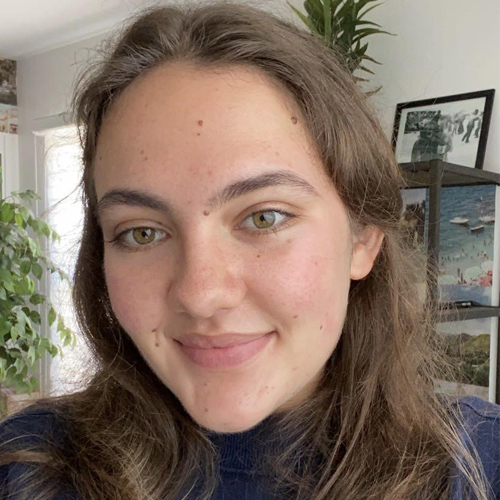 Celia Fisher is a fourth-year student majoring in rhetoric and writing studies. After working on the RWS newsletter for the past two years, she is incredibly thankful for her time in the department and the wonderful connections it has brought her. She hopes to continue with this style of writing after graduating this upcoming May, and hopes that the RWS newsletter will continue to thrive after she and her co-editor, Noelle Higgins, depart from SDSU.
Celia Fisher is a fourth-year student majoring in rhetoric and writing studies. After working on the RWS newsletter for the past two years, she is incredibly thankful for her time in the department and the wonderful connections it has brought her. She hopes to continue with this style of writing after graduating this upcoming May, and hopes that the RWS newsletter will continue to thrive after she and her co-editor, Noelle Higgins, depart from SDSU.
Noelle Higgins
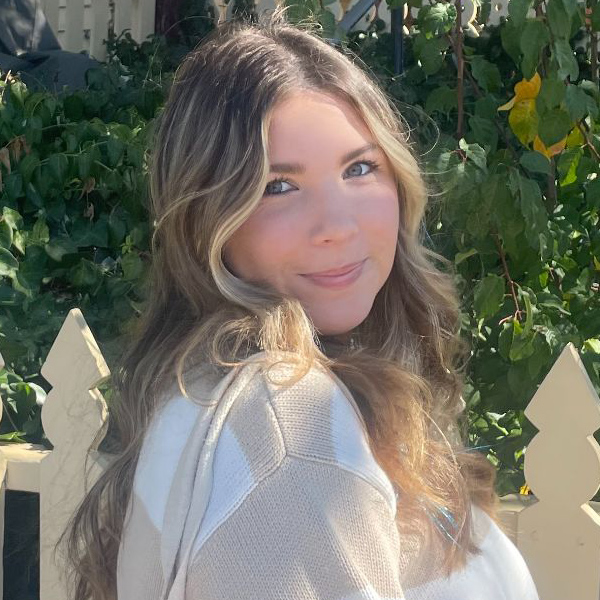 Noelle Higgins is currently a fourth-year rhetoric and writing studies major. She has enjoyed her time in the department immensely over the past few years both as a student and student worker. The RWS department will always hold a special place in her heart, and she is especially grateful for the wonderful opportunities she has come across and the special friendships she has made along the way.
Noelle Higgins is currently a fourth-year rhetoric and writing studies major. She has enjoyed her time in the department immensely over the past few years both as a student and student worker. The RWS department will always hold a special place in her heart, and she is especially grateful for the wonderful opportunities she has come across and the special friendships she has made along the way.
Chair's Note
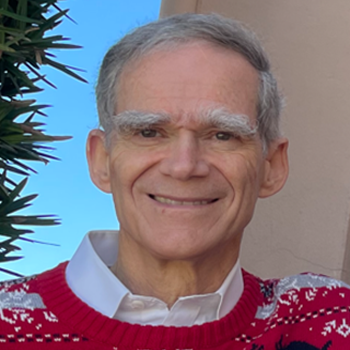 Dear colleagues, alumni, and friends of the Department of Rhetoric and Writing Studies,
Dear colleagues, alumni, and friends of the Department of Rhetoric and Writing Studies,
2023 marks the 30th anniversary of RWS! To celebrate this milestone and to reflect on our departmental history, this issue of the department newsletter features reflections by two women who played instrumental roles in the founding and development of this academic unit: Professors Emeriti Susan McLeod and Ellen Quandahl. These two teacher-scholars of rhetoric and composition had distinct, yet complementary roles in establishing and building our programs. To further our celebratory mood, I am delighted to announce the establishment of the Ann M. Johns Scholarship for Rhetoric and Writing Studies. This scholarship, made possible by a very generous endowment provided by Ann Johns, professor emerita of linguistics and rhetoric and writing studies, will support students pursuing degrees in the department.
Johns, one of the “Founding Mothers” of the Department of Rhetoric and Writing Studies, is an internationally known teacher-scholar who specializes in literacies, genre, and English for Specific Purposes. She has taught or consulted in 20 countries. Since her retirement in 2002, she has been consulting with — and writing literacy curricula for — diverse college-bound secondary students. She continues to be an active, innovative teacher at SDSU who requires extensive writing and analysis of texts in all her classes. Her commitment to students, particularly those who face linguistic, economic, and cultural challenges as they transition to college, is legendary. Read more about Professor Johns and the new scholarship.
Please join me in thanking our dear colleague Ann for her generosity and commitment to the success of our students and enjoy reading about a number of the many people and events that make RWS special.
Best wishes,
Glen McClish
The Landmark Lecture: Dustin Edwards
 Dustin Edwards is a first-gen college graduate who began his journey in academia at New Mexico State University. After switching his major nearly four times, Edwards recalls the struggle of finding a degree that would lead him down a clear path to finding a job. He initially thought that “a degree in journalism meant a job as a journalist. Clear. Easy.” However, things weren’t as easy as he imagined when he graduated in 2008 during the housing crisis and economic recession. Looking at a “daunting job market” prompted Edwards to continue in academia and earn his M.A. in rhetoric and professional communication. Due to his background in journalism, Edwards thought that he would be more interested in the professional communication aspect; however, after having the opportunity to teach first-year writing as a graduate associate, he “was hooked” and went on to complete a Ph.D. in composition and rhetoric at Miami University in Ohio. Following his Ph.D., Edwards worked as an assistant professor of writing and rhetoric for five years at the University of Central Florida in Orlando prior to joining us at SDSU in 2021.
Dustin Edwards is a first-gen college graduate who began his journey in academia at New Mexico State University. After switching his major nearly four times, Edwards recalls the struggle of finding a degree that would lead him down a clear path to finding a job. He initially thought that “a degree in journalism meant a job as a journalist. Clear. Easy.” However, things weren’t as easy as he imagined when he graduated in 2008 during the housing crisis and economic recession. Looking at a “daunting job market” prompted Edwards to continue in academia and earn his M.A. in rhetoric and professional communication. Due to his background in journalism, Edwards thought that he would be more interested in the professional communication aspect; however, after having the opportunity to teach first-year writing as a graduate associate, he “was hooked” and went on to complete a Ph.D. in composition and rhetoric at Miami University in Ohio. Following his Ph.D., Edwards worked as an assistant professor of writing and rhetoric for five years at the University of Central Florida in Orlando prior to joining us at SDSU in 2021.
As a recent addition to the RWS department, Professor Edwards was well positioned to organize SDSU’s most recent Landmark Lecture. Edwards, with the help of Karen Keene, Glen McClish, and Matt Gantos, chose the theme “Violence, Precarity, and Doing Rhetoric Otherwise in the Borderland.” After strategically selecting participants to lead the various discussions surrounding the issues that come with San Diego being a border city, Edwards landed on Sonia Arellano and Kenneth Walker.
The Landmark Lecture, for those unfamiliar, is “an opportunity for faculty, students, staff and scholars from outside the university to converse and engage in pressing issues that are circulating in the fields of writing studies, rhetoric, and composition.” Although this was the 22nd event, the Landmark Lecture is praised for keeping originality and relevance through every event. In the past, subjects addressed have ranged from ancient rhetorics, to online pedagogy, to linguistic justice. These lectures allow “us to get keyed-into the broader conversations happening in the discipline, and it’s a way for graduate and undergraduate students to get one-on-one time with academic leaders in our discipline,” Edwards says.
This year, Arellano and Walker gave a presentation together that focused on rhetoric in the borderlands. Each spoke on their own research projects relating to the matter. Walker presented his book project, “Climate Politics on the Border: Environmental Justice Rhetorics,” in addition to a community project about bird migration, extinction and Indigenous knowledge practices. Arellano spoke about her work with the Migrant Quilt Project, which touched on how quilting can honor those who have died while attempting to cross the U.S.-Mexico border.
Arellano and Walker both presented important insights that reflected in the discussion afterwards. Edwards states, “Moving back and forth between Dr. Walker and Dr. Arellano, we saw an accumulation of stories about border crossings, about violence, and about art-based projects that imagined this violent world otherwise.” Both speakers intentionally separated their viewpoints on the matter and drew a careful line between opinion and fact; clear steps were given to how they approached their work while also staying rather humble. Something that was done notably well was their ability to highlight the work of the community and participants alike. Edwards reflects on his appreciation for how the talk concluded, “Dr. Arellano ended on a hopeful note — that there are small, potent gestures we can make to change our worlds, to make them otherwise.”
Overall, Edwards notes that our perception of rhetoric contributes to our understanding of “language, frameworks, and practices related to living and negotiating our often-messy everyday lives.” Rhetoric “forms our relationships, our ways of understanding the world, and our ways of being in the world.”
After reflecting on the Landmark Lecture, Edwards suggests the following to any students seeking advice:
“I think it’s important to make things. Make things that matter to you and challenge yourself with finding creative forms that open you up to new experiences. Rhetoric can take you in so many different directions. There is certainly beauty in that, but it can be overwhelming too. Find what holds you, what keeps you invested and wanting to know more about.
I also think it’s important to be practical. What are your long-term goals and how can you get there? How can you interact with people who are in roles you desire and learn more about how they got there? How can you get experiences in your university years that will propel you into where do you want to go? Of course, that path may well change, but getting a wealth of experiences and talking to lots of different people might make the horizon on that path a little clearer.”
Spotlight: Sue McLeod
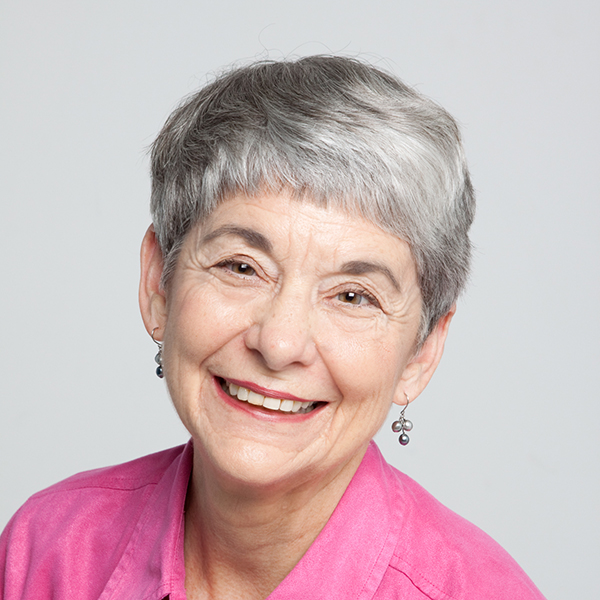 Asked to discuss her career and, more specifically, her role in the founding of RWS, Sue McLeod provided the following reflection:
Asked to discuss her career and, more specifically, her role in the founding of RWS, Sue McLeod provided the following reflection:
I enjoyed a long career in university teaching and administration (I was a writing program administrator, and also at various times a department chair and associate dean) and am now happily retired; at a certain point it’s important to step aside and let the next generation take over.
What I find most satisfying about my career is the fact that I was involved in developing a field of study that didn’t exist when I was in graduate school in the late 1960s and 1970s. As is the case with many of my contemporaries (Peter Elbow, Chuck Bazerman, Chris Thaiss), my doctorate is in English literature. The assumption was that if you studied great literature, you were then qualified to teach students how to write. It didn’t take long for many of us to figure out that this was not true, and because it was an experimental time in academe we felt emboldened to try to improve the situation, conducting research, experimenting with student-centered teaching techniques, and sharing our learning with each other at conferences; the Conference on College Composition and Communication provided a sort of second graduate education for us first-generation writing studies scholars. That’s a rather simple explanation of what happened when writing studies began to emerge as a separate discipline, but basically true. I feel fortunate that I was able to be a part of creating this new discipline, and particularly fortunate that I was asked to chair the committee on the major for CCC, since a major indicates that a discipline has finally arrived.
The period during which writing studies was growing and blossoming was an exciting time and also a frustrating one, since as it was emerging as a discipline in its own right, it was also growing apart from literature studies. Across the country writing programs began to separate from English departments, as linguistics had done before. As the developer of a Writing Across the Curriculum program at SDSU, I was part of a core group of writing faculty in the English department, all of us women, who were doing research in this new field. It was a time when academe was still very male-dominated; women were not always taken seriously as scholars.
As both a female lecturer and a faculty wife, I could see no future for me in the English department, so in 1986 I left to take a tenure-track position elsewhere. I remained good friends with Sherry Little (who had been my office mate) and Shirley Rose, who were two of the prime movers in the creation of the new SDSU Department of Rhetoric and Writing Studies. In 1990 the three of us got together one long afternoon at the Council of Writing Program Administrators Conference in Oregon to discuss their proposal for the break with English. My role was to respond to their draft proposal, to discuss the name for this new department, and to help them strategize about how to present the final proposal to the Faculty Senate (many members of the Senate had been in my WAC [Writing Across the Curriculum] Faculty Seminars). We then went out for a celebratory drink. The Senate passed their proposal in 1993, and the rest is history.
A word on the name of the new department. At the time there were several different names for the new discipline that was developing, none of them quite right. “Composition” was a difficulty because that term belongs to the Music Department; Google it and you will see. “Writing” was also problematic, since students assumed a writing department taught creative writing, and those classes were usually retained by English departments. It was Shirley Rose who came up with “Rhetoric and Writing Studies,” which I think perfectly captures the nature of our discipline. Some new departments/programs followed suit, for example the Program in Writing and Rhetoric (PWR, pronounced — I love it — “power”) at Stanford.
Faculty Profile: Erin Flewelling
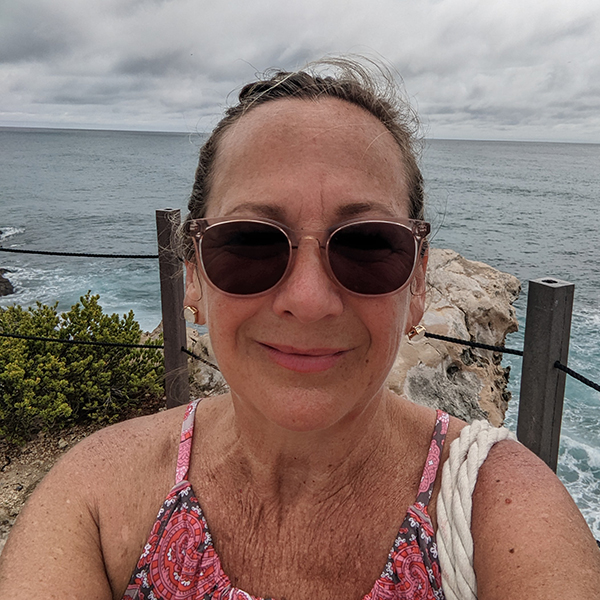 Since joining the department as a TA in 2009, Erin Flewelling has been a very involved member of the RWS program as a lecturer, as well as an assistant director in the Writing Center. Thinking back over her time in the department, she reveals, “I have always wanted to teach and write. Grad school reminded me how much I love research. And now I have a job that allows me to do all those things. It probably sounds a little nerdy, but I always felt like I would stay in school forever if I could just get paid for it, and that's my life now.” Her passion for the program is evident, and she has truly made an incredible impact on the department over the years.
Since joining the department as a TA in 2009, Erin Flewelling has been a very involved member of the RWS program as a lecturer, as well as an assistant director in the Writing Center. Thinking back over her time in the department, she reveals, “I have always wanted to teach and write. Grad school reminded me how much I love research. And now I have a job that allows me to do all those things. It probably sounds a little nerdy, but I always felt like I would stay in school forever if I could just get paid for it, and that's my life now.” Her passion for the program is evident, and she has truly made an incredible impact on the department over the years.
Flewelling describes how thrilling it was to come across the RWS department while looking at the M.A. programs at SDSU. Here’s how she puts it: “I didn't even know this was a thing! And it sounded so amazing, examining the way people present ideas, and there was the possibility of teaching at SDSU while a grad student” — it was the perfect fit. After joining the program, Flewelling mentions how much of an impact the program and people she encountered through it had on her. She specifically describes how the people she met within the department “taught [her] new ways to ask questions and expanded the way [she] views the world.”
When thinking back to when she was writing her thesis, Flewelling describes her experience as both rewarding and challenging: “I think I've never worked so hard on a project in my life. The research part was nothing but fun, asking questions and then just exploring random connections in order to develop cohesive claims. But organizing those claims into some cogent piece of writing that made sense to someone who wasn't me was like twisting a Rubik’s Cube.”
Flewelling goes on to describe the difficulty that comes with writing a thesis, but also the amount of support that the RWS department gave her, which ultimately provided the motivation to finish it. “I kept giving myself the same good advice that I was giving my students. Reminding myself that I should just write a bad paper, that I could revise later, that it didn't matter if it didn't make sense immediately,” she said. “Drs. McClish and Werry were incredibly helpful, asking questions that helped me figure out how to approach the various chapters. They were also very encouraging, reminding me that the ideas were there, and they mostly made sense. That encouragement kept me going.”
Flewelling also reflects on how grateful she is to have gotten to know the people within the RWS department. “Our support staff in RWS is amazing, and I love sharing reading ideas and creative ways to adapt essay prompts with colleagues,” she said. “I keep meeting really lovely students, people who want to learn, want to grow, want to be challenged. And I feel super connected to our writing center community, the directors and tutors I spend a lot of time with. We get to play around with ideas, with texts, with how to communicate, and how to convey ideas effectively.”
She goes on to describe just how much she has learned from this department and the people in it, and she mentions that there is one thing that has stuck with her the most: “I think perhaps the thing that I think about most is the construction of ethos, this idea that the way I communicate my ideas can determine whether or not people take my and my ideas seriously. And this influences the way I teach, the way I write, the way I interact with people outside of an educational environment. In particular, this was useful as I started teaching online asynchronous classes: I think about how I demonstrate shared values, concern, knowledgeability, fairness . . . and although I always want to convey my authentic self, I am mindful that different groups of people will value different aspects of myself.”
Faculty Profile: Ben Jenkins
 Ben Jenkins began his career at SDSU as the catering chef on campus just a few years before joining the RWS program. After working for Montezuma Publishing for a year, Jenkins commenced his work in the RWS program as a writing mentor. He recalls, “I did that for a couple of semesters before teaching my own RWS classes as a TA. At the time, I was pursuing my MFA degree. When I started working with various instructors, and then finally teaching my own classes, I fell in love with the discipline, and decided to pursue a teaching career with the department after graduation.”
Ben Jenkins began his career at SDSU as the catering chef on campus just a few years before joining the RWS program. After working for Montezuma Publishing for a year, Jenkins commenced his work in the RWS program as a writing mentor. He recalls, “I did that for a couple of semesters before teaching my own RWS classes as a TA. At the time, I was pursuing my MFA degree. When I started working with various instructors, and then finally teaching my own classes, I fell in love with the discipline, and decided to pursue a teaching career with the department after graduation.”
Jenkins describes how the RWS department has been a great support system when it comes to consistently pursuing his passions. Most recently, he is very excited to be teaching a new comics course that will be offered in spring 2024.
Jenkins reflects on his time working on his MFA while simultaneously working as a TA in the department — he describes this period of his life to be incredibly impactful when it comes to both his education and his career: “I particularly loved the TA training program the RWS department offered. The community of instructors, mentors, and fellow TAs created an enlightening space to work through some of the struggles that come with teaching a class for the first time. I’m honored to now work with the TA training program, and I really enjoy working with our TAs as they develop their teaching skills.”
When it comes to critical topics such as inclusivity, Jenkins mentions how grateful he is to work at both SDSU and with the RWS program: “Being a border community, and a region filled with a vibrant Indigenous presence, I’m glad to work at a place that respects those attributes, and strives to create a more inclusive learning environment.”
Jenkins aims to place an emphasis on inclusivity within the department, and he has been able to intertwine inclusivity into his courses in a way that is incredibly admirable. “Currently I’m working with our Global Rhetorics group,” he reveals, “and with the help of that community and our work, I’m able to develop more inclusive teaching practices and varying methods of rhetorical analysis for my classes.”
Thinking back to his time as a student, Jenkins offers some thoughtful insights: “The time management part of being a student is a skill that we don’t often learn about in a dedicated class, but it’s a huge part of successfully navigating academic life. Take the time to manage your school, personal, and social schedule, and try to find a balance that works for you.” Jenkins then concludes his valuable advice by emphasizing just how important it is for students to reach out and form connections with their instructors: “I wish I’d known how open and willing all the instructors are at SDSU. I haven’t met anyone teaching at the university that hasn’t put students first. When I was a student, I was a little intimidated to approach instructors to talk about my interests and research. Now that I’m a faculty member, I try to encourage students to take advantage of the opportunities they have while studying at SDSU.”
Emerita Profile: Ellen Quandahl
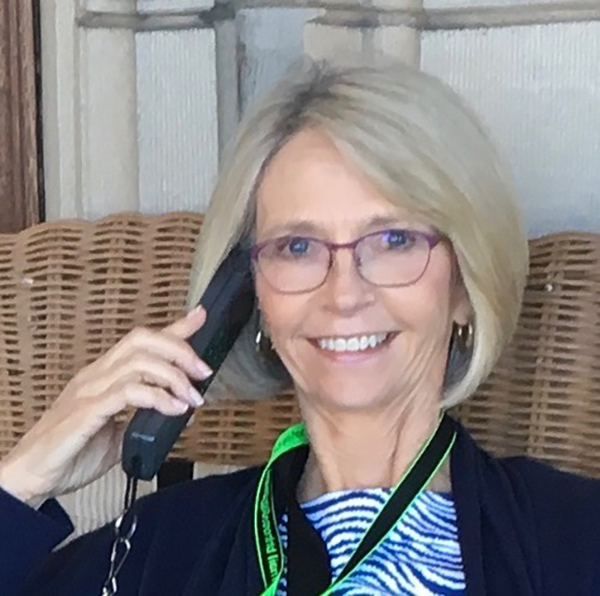 Ellen Quandahl is an incredibly accomplished member of the RWS community, both at SDSU and within the community of rhetoric and composition scholars as a whole — she played a major role in the development and growth of composition studies. Quandahl recalls, “I was fortunate to do my graduate work at the University of Iowa when composition studies was still coalescing as a discipline with histories, theories, and emerging topics of research. From my earliest conference experiences I watched the meetings of the Rhetoric Society of America grow from fewer than 50 people to a robust and diverse national organization. The Conference on College Composition and Communication and its journal have likewise grown, become more diverse, and provide fora on writing in social fields well beyond the academic classroom. Borderlands, religions, politics, sound, the visual, gender, the ambient, administration, dialects, industry, AI — all of these are emerging and changing areas of research.” Since her retirement, Professor Emerita Quandahl continues to keep herself very busy. “I sit on committees, manage a website, belong to several book groups, and engage in research as topics appeal to me,” she says. “I’m in touch with many rhetoric colleagues and we communicate about our interests.”
Ellen Quandahl is an incredibly accomplished member of the RWS community, both at SDSU and within the community of rhetoric and composition scholars as a whole — she played a major role in the development and growth of composition studies. Quandahl recalls, “I was fortunate to do my graduate work at the University of Iowa when composition studies was still coalescing as a discipline with histories, theories, and emerging topics of research. From my earliest conference experiences I watched the meetings of the Rhetoric Society of America grow from fewer than 50 people to a robust and diverse national organization. The Conference on College Composition and Communication and its journal have likewise grown, become more diverse, and provide fora on writing in social fields well beyond the academic classroom. Borderlands, religions, politics, sound, the visual, gender, the ambient, administration, dialects, industry, AI — all of these are emerging and changing areas of research.” Since her retirement, Professor Emerita Quandahl continues to keep herself very busy. “I sit on committees, manage a website, belong to several book groups, and engage in research as topics appeal to me,” she says. “I’m in touch with many rhetoric colleagues and we communicate about our interests.”
Quandahl’s contribution to the development of the RWS program at SDSU has made a big impact on making the program what it is today. “Coming to the Department of Rhetoric and Writing Studies in the second year of its existence offered the opportunity to help build a new department, and that was tremendously exciting,” she notes. “The collaborative work of envisioning a writing program with colleagues from rhetoric, linguistics, academic skills, and composition was challenging and intense. I look back with some pride on working with those people to create a writing program, and then a master’s degree, and then an undergraduate major during a time when there were fewer rhetoric departments in the country. I vividly recall representing the department at the SDSU Academic Senate on the day it approved the M.A. program. It was thrilling.”
Thinking back to her graduate work at the University of Iowa, Quandahl reflects on the many people that made an impact on her career: “My graduate school mentor, Richard Lloyd-Jones, who authored benchmark work in composition and developed the doctoral specialization in rhetoric at the University of Iowa; Kenneth Burke, the great 20th-century theorist of rhetoric whom I had the privilege of meeting several times; and, I suppose, Aristotle. Scarcely a day goes by when my reading doesn’t call to mind an idea from Kenneth Burke. Despite recent and important critiques, Aristotle’s works on emotion, happiness, virtue, and language are still anchors. During my first academic job — at UCLA writing programs — I was fortunate to work with Mike Rose, who taught us so much about the cultural competence and insights of non-traditional students, and I was greatly influenced by Mike’s friend David Bartholomae and his colleagues at the University of Pittsburgh. Their textbook ‘Ways of Reading,’ which has gone through so many editions, is still fantastic. It sounds like my influences were all men! But I had an undergraduate teacher, a woman and a feminist, who really introduced me to the whole concept of rhetoric. I don’t think I would have had a career without the work of feminist scholars like Pat Bizzell, Susan Jarratt, Lisa Ede, Cheryl Glenn, and many others.”
When discussing rhetoric, Quandahl describes her personal philosophy in the following words: “Rhetoric is everywhere! Watching how language (spoken, written, visual, musical) achieves effects and how rhetorical pedagogy embraces private and civic life are endlessly fascinating and important. Rhetoric bridges public address, poetics, psychology, politics, and a long teaching tradition. Just last week I listened to a podcast by southern California earthquake guru Lucy Jones, who has begun composing music to help people engage with climate change! She’s thinking about how it is that humans are moved, the emotional component that often engages us more deeply than information — and that is rhetoric.”
Quandahl goes on to describe one of her favorite writing projects that she has worked on, as well as her favorite courses that she has taught: “When I began studying ancient Greek, I met with a small study group of colleagues. Through various turns, we discovered and worked on the Byzantine historian Anna Komnene. It was breathtaking to see in her history comments about and evidence of a rhetorical training that was familiar from our work in ancient rhetoric. Over the years, I worked on Anna and wrote several pieces. The most recent, in Hawhee and Valiavitcharska, ‘The Practice of Rhetoric’ (University of Alabama Press, 2022), concerns history as a compositional and argumentative resource. The project encapsulates many of my interests: rhetorical theory and pedagogy, women rhetors, the persistence of the ancient rhetorical tradition.”
When asked about her favorite courses to teach, Quandahl could not pick just one. “In my early years in RWS I often taught Theory and Practice of Teaching Composition,” she says. “I enjoyed the challenging doubleness of it — watching my own practice and interaction with students even as we read about and discussed theory and practice, engaging in the kinds of pedagogy that I was encouraging students to try out.”
“The class is always intense and emotional, as everyone has strong ideas about what writing is and how to teach it, and strongly imagined ideas about what it is that students need to know. I admired the students, their intense efforts, and their writing. Many I now consider friends and colleagues. I also taught the history of rhetoric course almost every year, in a time when the narrative of rhetoric’s history was changing and the scope of ‘antiquity’ and ‘the classical’ morphed from ‘western’ to a rich crossroads of cultures. So there was always new material to learn and share, and there was the challenge of showing the ongoing relevance of ideas from a cultural past very different from our own situation. Just last week The Washington Post published an article called ‘As Black Educators, We Endorse Classical Studies,’ both acknowledging the oppressive dimensions of past practices and embracing the long conversation about what it is to be human, to communicate, to live well. What could be more engaging?”
Lastly, Quandahl shares two pieces of incredibly valuable advice for current students:
- Seek out mentors whose work intrigues you. Use writing to figure out what you think and what you need to know. Practice trying on the methods and approaches of various scholars. Attend conferences. If you’re interested in the history of rhetoric, don’t be afraid to learn Greek and/or Latin — they are still relevant!
- Mentors and colleagues are profoundly important. I was a shy student, shy about asking for help and about asking how to shape a research agenda. Now I know that people in our field are generally kind folks who welcome any and all questions.
Student Profile: Kenya Benitez
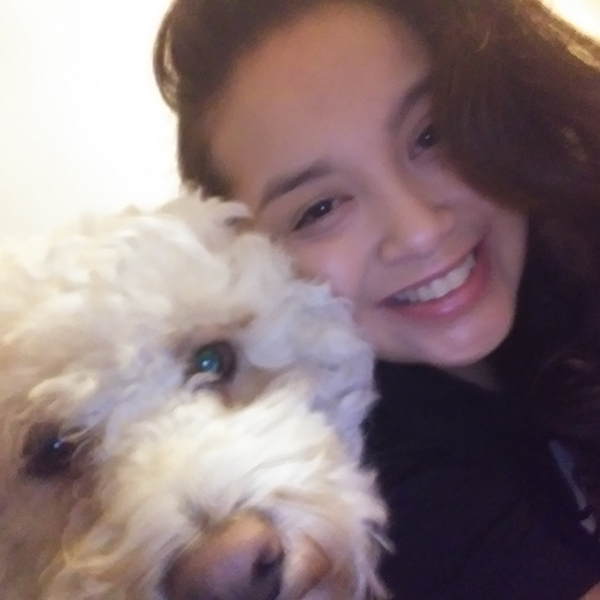 Kenya Benitez has just completed her undergraduate degree in rhetoric and writing studies. With goals to attend graduate school and earn her master’s in public health, Benitez is thankful that the RWS department has pushed her to learn writing and critical thinking skills that will be applied in her future career as a possible public health analyst/program specialist for California’s Department of Public Health.
Kenya Benitez has just completed her undergraduate degree in rhetoric and writing studies. With goals to attend graduate school and earn her master’s in public health, Benitez is thankful that the RWS department has pushed her to learn writing and critical thinking skills that will be applied in her future career as a possible public health analyst/program specialist for California’s Department of Public Health.
While her two interests — writing and healthcare — may seem to be on opposite ends of the spectrum, Benitez finds that they complement each other rather nicely.
Even though Benitez didn’t begin college with a focus on RWS, she recalls her decision to switch from nursing her sophomore year being influenced by her love for writing and how it has “been her passion since she was young.”
In addition to her underlying interests in this field, Benitez mentions how the pandemic also played a significant role in determining her next move. As a sophomore during the peak of the pandemic, Benitez was frequently worried that attending nursing clinicals would put her health at risk. Though she had a hard time giving it up, she remembers thinking to herself during her final decision to switch majors, “I am trading one passion for another.” After taking a leap of faith, hoping that the major would “improve and provide [her] with the skills to formulate better arguments,” Benitez can confidently say that she feels prepared and has learned to do just that.
She specifically thanks the program for teaching her how to “analyze a rhetorical situation” — a skill Benitez thought was only implied in writing spaces, but has come to learn that it is recognizable everywhere. Her now trained eye has not only learned how to observe this in everyday life, but also how to use it to her advantage in situations like job interviews. Benitez directly thanks Dr. Salas for fostering her ability to continue perfecting her research skills, as well as allowing her to be creative and pick her own subject to do a research paper on. When Benitez wrote about her chosen topic of “The Rhetoric of Tattoos,” she mentions that she was able to “apply the skills and knowledge that [she] learned in previous RWS courses.”
If Benitez could go back in time and tell her freshman-year self what to expect when joining the RWS program, she wishes that she knew about all of the opportunities the major entails. From the RWS 506 internship course, employment options at the writing center, as well as being able to become an RWS writing mentor, she would encourage any undeclared freshman to look into the program and consider majoring in it. Benitez’s final thoughts on RWS are concluded positively by the following statement: “The material one learns in RWS classes can be both practical and philosophical. Rhetoric pushes students to explore perspectives that they may have not otherwise considered. Yes, RWS students learn to be better writers, but also better critical thinkers and analysts.”
Student Profile: Matt Louie
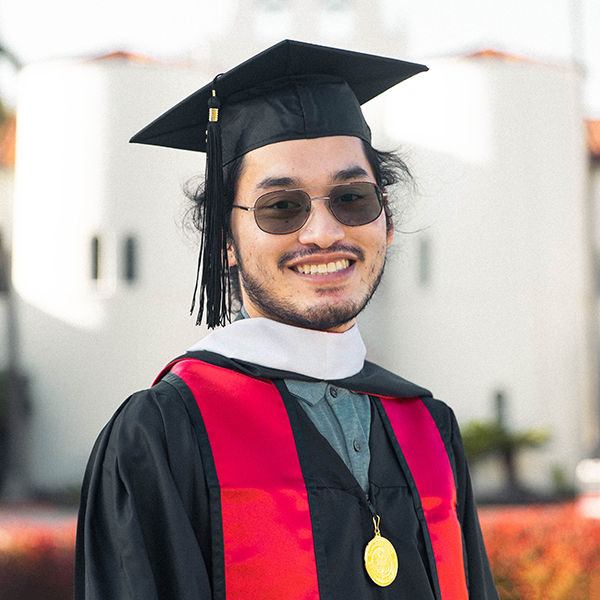 As an SDSU master’s student who has just gone through graduation, Matt Louie is grateful for his discovery of the RWS program. After earning his bachelor’s degree in psychology and sociology, Louie found “the only California State University (CSU) with a dedicated rhetoric/composition department” and mentioned that because the program’s focus wasn’t solely on English literature, he was able to “get training and take classes on topics that relate to [his] ultimate career goals in rhet/comp.” It was actually because of a fellow writing consultant at the writing center that Louie was able to find out more about RWS.
As an SDSU master’s student who has just gone through graduation, Matt Louie is grateful for his discovery of the RWS program. After earning his bachelor’s degree in psychology and sociology, Louie found “the only California State University (CSU) with a dedicated rhetoric/composition department” and mentioned that because the program’s focus wasn’t solely on English literature, he was able to “get training and take classes on topics that relate to [his] ultimate career goals in rhet/comp.” It was actually because of a fellow writing consultant at the writing center that Louie was able to find out more about RWS.
Despite having a different major prior to entering the master’s program, Louie feels as though he wasn’t any less prepared to study in the field of writing and that the master’s program has allowed him to progress in his area of study. Louie recalls that his work in psychology was “focused around language and stigmatization (which was essentially [him] talking about how rhetoric and language constructs the ways in which we understand others.)” Not only has this helped him learn about those around him, but it also helped him go about learning how to teach writing.
Louie’s favorite course at SDSU thus far is one that has “played the largest role in [his] studies and beyond.” RWS 596: Decolonial Rhetorics, with Consuelo Salas, helped Louie “bridge some of the conversations [he] had outside of the university (regarding decolonization on [his] home island of Guam) to academia.” Louie is thankful that he got to experience how rhetoric is theorized and discussed with regard to decolonization, in addition to being able to contribute to the conversation with matters from his personal life and as a Chamorro (the Indigenous people of Guam). He adds that the seminar paper he wrote for this class was “one of my favorite papers that I have written.”
Building on his cultural history, Louie attended the Conference on College Composition and Communication on February 17, 2023, to speak about his research relating to incorporating food into the classroom environment; he hopes to show students that “the knowledge they have from their home (or cultures) — like food — is something that can be utilized to understand and participate in conversations in academia.” Louie hopes to tie together food and rhetoric to showcase discussions in topics like translanguaging — utilizing a person’s multiple dialects and creating a way to view them as “fluid and interconnected” — and also showing that “elements of culture — like food and language — don’t exist in a singular/standard way but, rather, can take multiple forms or styles to fit the needs of different people.”
Louie is incredibly grateful for both the structure and freedom that the RWS master’s program has given him. He has enjoyed his time here so much that he is planning on pursuing a Ph.D. in rhetoric and composition. He will be attending University of Wisconsin-Madison in the fall and is confident that his M.A. in RWS from SDSU “will serve as the foundation for [his] future coursework, teaching, and scholarship within the field of rhetoric and composition.”
RWS Newsletter Editors Abroad
Celia Fisher and Noelle Higgins
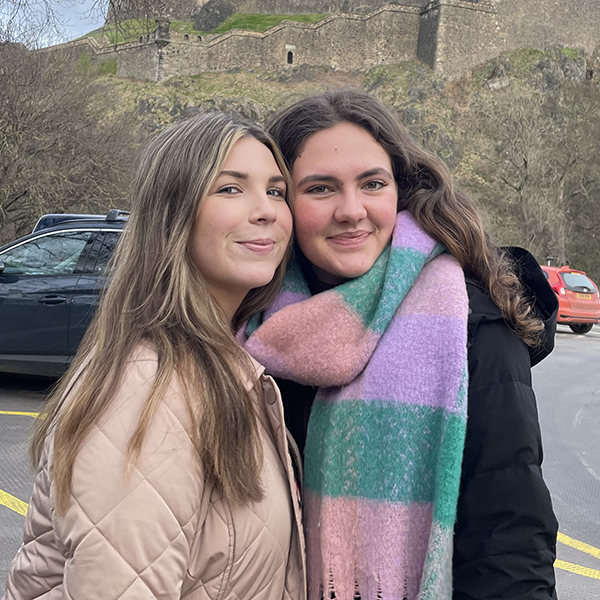
This past semester, we (Celia Fisher and Noelle Higgins) have been fortunate enough to spend the first half of 2023 studying abroad as RWS majors — Celia, at the University of Strathclyde in Scotland and Noelle, at the University of Kent in England.
We were both so fearful yet equally thrilled by what the future could hold for us as we departed from our parents at our hometown airports. Waving goodbye to friends and family and starting our new ways of life across the world was just the start of our adventure — the first being adjusting to the weather, considering that we both grew up in Southern California. Nonetheless, little did we know that once we stepped off the plane in our new (soon to be favorite) cities, we would experience a chapter in our lives that is indescribable.
Though I (Celia) knew that adjusting to a different culture would be somewhat shocking, I figured that being in a country that spoke English would be relatively simple. Little did I know that the Glaswegian accent is one of the most difficult ones to understand; even as I write this at the end of my term, I’m still never positive I can understand their phrases on my first try. Nonetheless, the charming people really do make Glasgow, and I wouldn’t have it any other way.
At my host university, I was able to enroll in several courses that would allow me to further my understanding of rhetoric. My favorite class was a third-year course titled “Gender and Celebrity Culture.” In both a small and large lecture, we met twice a week to discuss the ways that gender plays a significant role in the media and how certain language enforced by society can carry both negative and positive connotations depending on the target audience. We looked at a variety of examples of celebrity behavior and learned that oftentimes a man will receive less backlash than a woman in the same position; the rhetoric associated with him is light-hearted and forgiving, whereas the rhetoric characterizing the woman is shameful and manipulative. Examining the different sides to this only reminded me that written, spoken, and visual language will always be able to consciously and subconsciously persuade any given audience. It is a true skill and is something that will always interest me about RWS.
Outside of class, I met other exchange students in the same position, and we took on everything that came with moving to a new country together. While I learned how to do so many things abroad like figure out the public transit, the Scottish grading system, currency conversion, and memorizing my UK phone number, the one thing I never understood, despite my trying, was the Scottish love for beans on toast and why there needs to be mayonnaise on everything. Though I like to think of myself as open minded, I have yet to find a reason that makes sense for this.
But in all seriousness, studying abroad in Scotland has been the best experience of my life. Though leaving home was hard and not seeing my family for quite some time was an adjustment, gaining this much independence is something that I will be forever grateful for. I was able to explore all of Scotland and see so many parts of their beautiful country. From the Highlands, to the Isle of Skye, to the Harry Potter Bridge, the only flaw I can find is the gloomy weather, and yet I was still able to appreciate that too. In my spare time, I discovered cheap flights via the infamous RyanAir, did a two-and-a-half-week backpacking trip through Europe, met people from all over the world, and found myself trying to savor the moments I knew would soon be fleeting.
Just like Celia, in January of 2023, I (Noelle) packed up all of my belongings and moved to the United Kingdom for four months. I was going to be attending the University of Kent in the small town of Canterbury, England. Studying abroad had always been a dream of mine, so landing at the London Heathrow airport was one of the most exciting moments of my life. I felt as if I was constantly learning fundamental life lessons while I was abroad — I was able to gain so much confidence and independence which has helped me in so many ways already. Over the past few months, I am so fortunate to have been able to have gotten to see so many beautiful and historic cities in the UK and Europe, while also meeting so many incredible people along the way. I even got to meet up with Celia in one of my now favorite cities, Edinburgh, Scotland!
Throughout my time studying at the University of Kent, I found myself constantly finding new ways to deepen my knowledge of and understanding of rhetoric. Specifically, one of my favorite courses was Reading Victorian Literature, which focused on a different novel, poem, or short story from the Victorian Era each week. With both a lecture and seminar on each text, I was able to develop a deep understanding of the forms of rhetoric that the Victorians interacted with. It was through this course that I found myself analyzing the many ways in which rhetoric has been used in the past, as well as how these forms of rhetoric still impact us today. I loved looking at rhetoric through a historical lens like this — I found myself constantly coming back to this idea that rhetoric is used to construct identity (which I found to be incredibly prevalent in novels we read such as “Middlemarch” and “Oliver Twist”). This course just continued to further my passion for RWS, and I greatly enjoyed discussing the many different perspectives my peers and lecturers had on the different forms of rhetoric we analyzed throughout my term.
This was the first time I had ever left the United States, and I remember being incredibly apprehensive to go completely alone. Little did I know that that would be the best decision of my life. Canterbury is such a charming city, and naturally I fell in love with it immediately. It was the perfect home away from home for me, and it was in such close proximity to the bustling city of London. For me, traveling to different cities and countries was a goal, but it was also incredibly important to me that I immerse myself into the city I was studying in.
It was such an indescribable and fulfilling experience to build a life in a completely new country. Whether it was through befriending other study abroad students from all across the world, getting to know the locals (people like my flatmates, service workers, and classmates), or simply picking up some of the British dialect, I never expected to feel as connected to the city and people I met as much as I did. I am so thankful to both SDSU and the RWS program for giving me the opportunity to have an experience of a lifetime and memories that I will cherish forever.
As we reflect on our time abroad, we are both so grateful that our involvement in the RWS department allowed us to have these unforgettable experiences. Rhetoric is truly everywhere, and it was such a blessing to be able to interact with and interpret the many different forms of rhetoric that we came across in our travels.
Chair's Note
 As I peruse this issue of the RWS Newsletter, I am grateful for the many RWS students and colleagues who have studied, taught, and pursued research in this department during my decades here, from Professor Ann Johns, the first person I met when I interviewed for my job at SDSU, to Professors Linn Bekins and Cali Linfor, who entered the faculty the same year I began, to students such as Emma Bardin, Jenny Varichio, and Missy Watson, who earned master’s degrees with us before going on to do great work in a variety of fields, to recent graduates such as John Berry, who earned his bachelor’s degree in May 2022 and has just launched his post-baccalaureate career. And I’m proud of former students who, like René De los Santos, are now my teaching colleagues within the department. These specific rhetoricians, all featured in this issue, demonstrate the rich array of perspectives, passions, talents, and commitments that distinguish this department.
As I peruse this issue of the RWS Newsletter, I am grateful for the many RWS students and colleagues who have studied, taught, and pursued research in this department during my decades here, from Professor Ann Johns, the first person I met when I interviewed for my job at SDSU, to Professors Linn Bekins and Cali Linfor, who entered the faculty the same year I began, to students such as Emma Bardin, Jenny Varichio, and Missy Watson, who earned master’s degrees with us before going on to do great work in a variety of fields, to recent graduates such as John Berry, who earned his bachelor’s degree in May 2022 and has just launched his post-baccalaureate career. And I’m proud of former students who, like René De los Santos, are now my teaching colleagues within the department. These specific rhetoricians, all featured in this issue, demonstrate the rich array of perspectives, passions, talents, and commitments that distinguish this department.
Happy reading!
Glen McClish
Diversity, Equity, and Inclusion: Cali Linfor
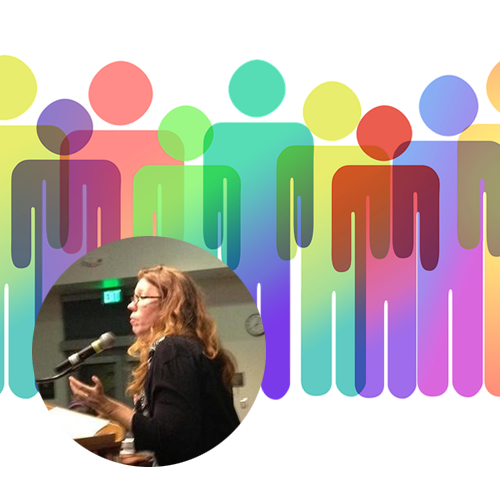 Cali Linfor started her career at San Diego State University by obtaining her MFA in poetry. “I am a poet by training and poets are, by nature, rhetorically interested in knowledge creation, how communication works, et cetera.” As a result, she found herself to be incredibly interested in rhetoric, and more specifically how rhetoric pertains to educational equity work. Early on in her career, Linfor got involved in community outreach work regarding local high schools. Her goal was to “allow students a smoother transition between their high schools and their future colleges or jobs,” which helped to inspire her work with educational equity.
Cali Linfor started her career at San Diego State University by obtaining her MFA in poetry. “I am a poet by training and poets are, by nature, rhetorically interested in knowledge creation, how communication works, et cetera.” As a result, she found herself to be incredibly interested in rhetoric, and more specifically how rhetoric pertains to educational equity work. Early on in her career, Linfor got involved in community outreach work regarding local high schools. Her goal was to “allow students a smoother transition between their high schools and their future colleges or jobs,” which helped to inspire her work with educational equity.
“My field of interests really looked at structural inequities, especially how they manifested through literacy and also then developing an expertise in how to teach teachers to teach rhetoric. My role in the department has been a position of community liaison in a lot of ways — intersegmental partnering in terms of issues of rhetoric and teaching in pedagogy.”
Linfor describes how deeply she is interested in equity and making the RWS department more equitable. As a co-founder of the Anti-Racism, Equity, and Inclusion Working Group, Linfor expresses that she sits on the RWS Diversity Committee and works to implement the department’s diversity plan. Linfor explains that she wrote a global rhetorics grant with her colleagues Karen Koss and Consuelo Salas, who are working to “shift the fundamental ideas of what we teach away from Eurocentric and Greek rhetorics into a global perspective of rhetorical concepts.”
Linfor explains how the department’s Anti-Racism, Equity, and Inclusion Working Group began as a movement within the department when several members of the department decided that they “wanted a space to reckon with the policies and look at the department and [their] experiences through the lens of what it would mean to be anti-racist, equitable, and inclusive.” And that is exactly what they did. Linfor mentions how the field of rhetoric stems from a “normative understanding of the world, and since rhetoric is about communicative acts, it’s given power to those normatives and there’s a reckoning around that. At the same time, rhetoric is the key to opening [equity] up. And we can do so by honoring the communicative acts of our own communities.”
When it comes to the term “diversity,” Linfor expresses how it “really means to create a culture and change basic policies and paradigms to where all different ways of existence are valued as resources.” In fact, she expressed a dislike for the term in general. “Diversity tends to have to do with numbers, right? Meaning that one measure of a department’s diversity is the ability to quantify a range of membership in that department. Whether that’s from gender lines, or ability lines, or ethnic lines, or schools of thoughts lines, or class status lines. Those things as quantifiable measures are important, but I’m more interested in issues of equity.”
At present, Linfor is working on revising a book she wrote titled “I Animal.” The book aims to look at “what happens when we cut ourselves off from identifying as human animals. It’s an interesting book rhetorically because a lot of times poetry is seen as very inaccessible. If you’re reading electronically and you take the cursor, you can scroll over the words and it will connect to allusions I’m making.” Along with this project, as a professor of equity at SDSU, Linfor is especially interested in creating safe spaces, “celebrating the rhetorical traditions of people, and concentrating on futurity — what we call the elsewhere and the otherwise.”
Linfor shared some incredibly valuable and impactful advice for current students. “I think that staying intellectually curious, having specialized interests (in equity or whatever it is), and a passion about that is really important,” she says. “It’s also important to embrace the diversity of our field in terms of how we get here, and be joyous for however you arrived here, whether that's as a journalist or a technical writer. Because each one of those fields has enormous things to add to our discipline. Just like me as a poet. Everyone has room in this department.”
Spotlight: Ann Johns
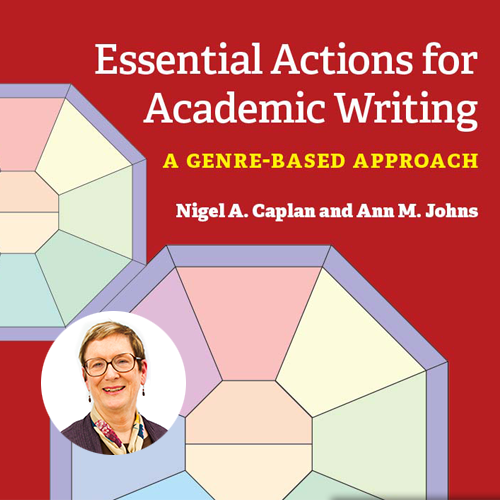 Professor Emerita Ann Johns is a renowned scholar in the field of applied linguistics. She began as a history major at Carleton College and has an M.A. in the teaching of history from the University of Chicago. Following her graduation, she experienced a once-in-a-lifetime opportunity when she moved with her family to Egypt, where she not only taught English and history, but also devoted herself to completing another M.A. in the teaching of English at the American University in Cairo. Johns spent time at yet another university, USC, where she was able to complete her Ph.D. and write her dissertation, titled “Cohesion in Written English.” Her early career life really took off when she moved to San Diego with her husband and founded the American Language Institute, enrolling roughly 1,000 students at the time along with 80 instructors and administrators. Clearly accomplished in her field, Johns places emphasis on “taking every opportunity you can to learn.”
Professor Emerita Ann Johns is a renowned scholar in the field of applied linguistics. She began as a history major at Carleton College and has an M.A. in the teaching of history from the University of Chicago. Following her graduation, she experienced a once-in-a-lifetime opportunity when she moved with her family to Egypt, where she not only taught English and history, but also devoted herself to completing another M.A. in the teaching of English at the American University in Cairo. Johns spent time at yet another university, USC, where she was able to complete her Ph.D. and write her dissertation, titled “Cohesion in Written English.” Her early career life really took off when she moved to San Diego with her husband and founded the American Language Institute, enrolling roughly 1,000 students at the time along with 80 instructors and administrators. Clearly accomplished in her field, Johns places emphasis on “taking every opportunity you can to learn.”
One could argue that Johns is self-taught, as she talks about never having taken a teaching of writing course; which makes her accomplishments all the more impressive. She gives credit to “some of the great names in second language writing: John Swales, Ken Hyland, Vijay Bhatia, Chris Feak, and Chris Tardy” for mentoring her and allowing her to read their brilliant work, some of which inspired her to complete research with students from her classroom as participants. This prompted one of her questions in her best-known paper in Written Composition that deals with how “a Vietnamese-speaking SDSU student continued to fail our timed essay-writing exams but made ‘A’ grades on his short-answer tests in biology,” which led Johns to ask, “How could that be? Perhaps we should reconsider what we are teaching in academic writing classes.”
As an avid traveler with a goal of writing curricula for composition classes, Johns acknowledges how different academic writing is in different parts of the world, which is why during her Fulbrights in Lebanon and South Africa she specifically made a point to “develop courses for local college students.” In China, she worked with a “fine rhetorician, Rick Coe, in programs for experienced language teachers.”
Throughout her life, Johns has placed an emphasis on the value of being able to write and teach curricula. After some time, she decided to shift her main focus from strictly research to teaching. After being “promoted to full professor” and then retiring, Johns states that she is “free to write what [she] believe[s] is much more useful to teachers: a textbook based on genre theory.” She was incredibly passionate about writing this textbook, and when a colleague from the University of Delaware, Nigel Caplan, approached her with an idea to collaborate on the book, Johns was thrilled. “We worked together for more than five years on this book, agreeing on most points but disagreeing on others, writing, revising, and writing again, until we came up with the publishable volume, ‘Essential Actions for Academic Writing: A Genre-Based Approach’ (University of Michigan Press, 2021).” Johns mentions how much she learned from co-writing this text and credits Nigel Caplan as the “first author.” She has worked on and written three different volumes for Michigan.
Out of her numerous rhetorical accomplishments, Johns discusses that some of the most interesting projects that she has worked on took place in South Africa and Lebanon while she was a Fulbright scholar. While she was there, Johns was fortunate to be able to work “closely with local faculty and administrators and their students to produce academic English curricula that were appropriate for the context in which [they] were working.” She worked diligently on this project, as it “involved interviews with various stakeholders, analyses of student writing and university textbooks, testing materials, and LOTS of meetings,” while also making wonderful friendships along the way.
Johns offers some incredibly relevant advice for current students who are looking to further their education in the field of rhetoric and writing. She emphasizes the following:
- Take every opportunity to learn that you can. For example, your instructors are experts — ask them questions. Your fellow students have interesting lives. How can you work with them to gain knowledge and become better teachers and researchers? Become involved. Create communities.
- Despite its dangers (and they were present, even when we traveled), see the world. And, more importantly, live and work in different parts of this shrinking globe. Apply for a Fulbright, for example.
- Enjoy! My family and I (husband and three kids) had a wonderful time traveling, meeting people, expanding our horizons, studying the local languages, etc.
- And analyze texts from the genres in your worlds. It's fun.
Faculty Profile: Linn Bekins
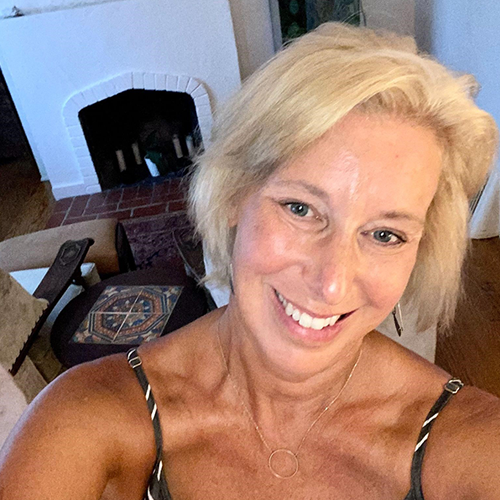 Linn Bekins is a professor in the RWS department who has been at SDSU for 23 years. She is described by her students as “caring” and “approachable” and values her teaching style that is focused around her constant care for her students’ well being. She credits her student-centered pedagogy to two “wonderful mentors” at the University of Utah, Tom Huckin and Marueen Mathison, who also emphasized the importance of empirical research.
Linn Bekins is a professor in the RWS department who has been at SDSU for 23 years. She is described by her students as “caring” and “approachable” and values her teaching style that is focused around her constant care for her students’ well being. She credits her student-centered pedagogy to two “wonderful mentors” at the University of Utah, Tom Huckin and Marueen Mathison, who also emphasized the importance of empirical research.
Coming from a non-academic family background, Bekins is a self-made learner who took opportunities into her own hands when building her academic career. Her love of learning, inquiring minds, change, and challenge were all factors in her decision to work with adult learners. Her core values are centered around analytical thinking, unquenchable curiosity, and highly interactive academia, which is why the courses she enjoys teaching the most are RWS 508W and 607: Scientific Writing and Writing Project Management, respectively.
Teaching these courses has allowed Bekins to engage with students of all interests. She values the interaction with the science-focused students, how to tie in rhetorical emphasis, as well as how to bring in a linguistic approach. She values the diversity in the course and how science and writing are combined flawlessly in an environment that encourages students not to limit themselves. As for RWS 607, Bekins’ primary role is to engage with students in the transition between academia to the professional world. She brings in speakers, as well as alumni who offer their insights on the world of writing which also contributes to her appreciation for the varied nature of the two topics.
If Bekins could go back in time, she would tell her younger self and those like her to “be surrounded by people that challenge you, be proactive in sharing, expanding, and co-creating knowledge, and learn how to apply what you are learning in the classroom to the world outside academia: you are learning the tools to enact the change you’d like to see in the world.” Bekins will follow her own advice as she continues to teach at SDSU while taking on new consulting experiences. She has recently been working with an international user/experience design group that works on the topic of gendered financial literacy in the workplace. Balancing her work life with her family/social life, Bekins is looking forward to spending time with her three sons, cooking her favorite Spanish tapas, and training for long distance stand up paddle board competitions.
Faculty Profile: René De los Santos
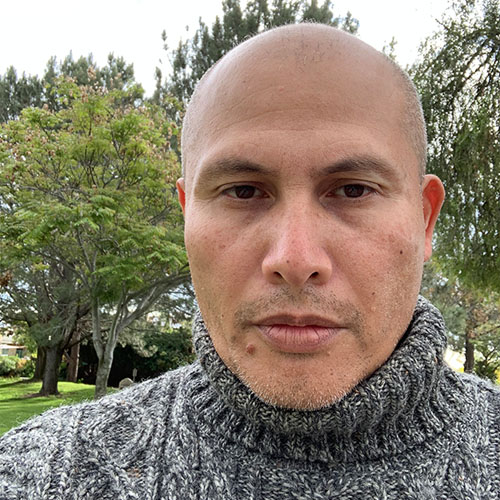 René De los Santos has spent much of his time at San Diego State University as a student and most recently, as a lecturer. He mentions that originally as an English student, he “stumbled into rhetoric” through a Rhetoric of Science course that he found to be “really different from what [he] had ever seen before — the questions that were being asked and the topics that were being addressed were just really mind-blowing for [him].” After taking this course, De los Santos found much inspiration to research rhetoric further through his master’s thesis which was the “Rhetoric of Standard Time” and for his Ph.D. studies.
René De los Santos has spent much of his time at San Diego State University as a student and most recently, as a lecturer. He mentions that originally as an English student, he “stumbled into rhetoric” through a Rhetoric of Science course that he found to be “really different from what [he] had ever seen before — the questions that were being asked and the topics that were being addressed were just really mind-blowing for [him].” After taking this course, De los Santos found much inspiration to research rhetoric further through his master’s thesis which was the “Rhetoric of Standard Time” and for his Ph.D. studies.
De los Santos passionately describes his experience of writing his thesis, mentioning how he enjoyed how “it was this exploration and delve into history. People who have long ago died and yet, here they are right in front of you. They are speaking to you, they are speaking to somebody at the moment, and they are making cases for time.”
Through his research of the rhetoric of standard time from the 19th Century, De los Santos learned about the different cases and systems that were being made for standardized time. “I really wanted to understand the questions–how did we get there and how did we come to adopt these time systems that we now take for granted. It was fun for me because…I never really thought about the confluence of rhetoric and technology and science.” He mentions that the SDSU library publishes student’s theses and his thesis can be found in the bookstacks there.
During his time as a student, De los Santos found studying rhetoric to be incredibly beneficial and educational. “I think it's really the idea of being exposed to things that I had never really been exposed to before, especially the idea of rhetoric and how it functions and the dynamic aspects of it. We take a lot of things for granted and we don’t really think about it. What was really eye-opening for me was the idea that language and how we use images… can be a very powerful force in our society.” From his time as both a student and as a teacher, De los Santos was fortunate to have been able to establish his passions and incorporate them into his studies and courses. He mentions how he has loved being able to include his passion for history into rhetoric courses that he has taught and projects that he has worked on. De los Santos discussed how he incorporated both of these passions within his doctoral dissertation that he wrote about the Mexican ministry of finance, which covered “their rhetoric in the aftermath of the Mexican Revolution.”
In terms of his more current research since obtaining his Ph.D., De los Santos has had many exciting projects and continues to have even more in store. He mentions the importance of Latin American rhetorics throughout his career and how he has spent much time bringing awareness to it. During one of the Rhetoric Society of America conferences a few years ago, he states that he was “able to get the first panel ever dedicated to Latin American rhetorics,” which is an incredibly huge accomplishment within the field. He has also spent time furthering a previous project on the “Dreamer” population returning to schools in Mexico. “The whole point of the project was to try to use data that we were getting about their educational needs and experiences to try to reevaluate the curriculum that the university has there.” With that previous project in mind, De los Santos is furthering his work by researching how the “dynamics of education is changing because of this influx of new immigrants” and how rhetoric plays a role in that. He and his colleagues are working toward creating a “broader… binational understanding of how education works.”
Reflecting on his time as a student, De los Santos expresses incredibly beneficial advice to current students. “It’s important to really understand the discipline that you are in, but also be open to what other disciplines offer you — what other lenses you can use to approach a certain topic” He explains how valuable it is to explore different worldviews and perspectives, because it holds us accountable and “keeps us honest.” De los Santos adds that with the perspective of both a student and a teacher, RWS at San Diego State University is an admirable program and especially notes the excellence of Glen McClish. “You can compare it to other programs, and I have, and I think Dr. McClish has done an excellent job… really creating a program that I believe has” been able to get “students prepared for whatever future that they desire to pursue.”
Alumni Profile: Emma Bardin
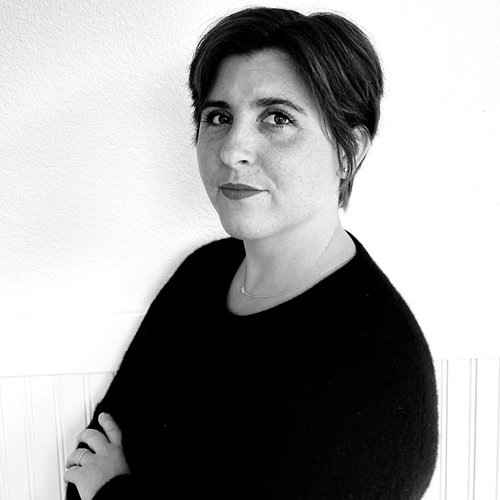 Emma Bardin is a science writing consultant who graduated from San Diego State University with her master's specializing in the teaching of writing in 2013. During her years at SDSU, Bardin was able to teach three semesters of RWS 100 and 200, which she recalls as the most iconic moment for her as she walked into Hepner Hall to teach her first class. Bardin describes how much getting her M.A. meant to her and how every opportunity has shaped her into being able to craft her career into what it is today. “My M.A. is why I have received every job since graduation, and it's why I was able to found my science writing business, Bardin Consulting,” states Emma. “Be open to new opportunities of how your M.A. can impact your professional trajectory. First I was a college professor. Next an English teacher for grades 9-12. Then I was a college counselor. And now I write all things science for biotech companies. The common thread: a rhetorician who can tailor content to a given audience and goal.”
Emma Bardin is a science writing consultant who graduated from San Diego State University with her master's specializing in the teaching of writing in 2013. During her years at SDSU, Bardin was able to teach three semesters of RWS 100 and 200, which she recalls as the most iconic moment for her as she walked into Hepner Hall to teach her first class. Bardin describes how much getting her M.A. meant to her and how every opportunity has shaped her into being able to craft her career into what it is today. “My M.A. is why I have received every job since graduation, and it's why I was able to found my science writing business, Bardin Consulting,” states Emma. “Be open to new opportunities of how your M.A. can impact your professional trajectory. First I was a college professor. Next an English teacher for grades 9-12. Then I was a college counselor. And now I write all things science for biotech companies. The common thread: a rhetorician who can tailor content to a given audience and goal.”
One of the beautiful things about learning how to write professionally is being able to tailor the style of writing to the type of career you want. Bardin seems to have mastered this skill since switching trajectories in her path in life several times since graduating as she now writes “everything science.” From website copy to case studies, leadership bios, awards submissions, thought leadership articles, blogs, conference materials, press releases, and scripts for crowdfunding videos, Bardin has used her skills from the RWS department to leverage her rhetorical training to craft content for a variety of audiences.
Bardin recalls the most interesting project she worked on thus far was drafting a case study for the biotech company Metabolon. She was able to dig deep into scientific articles and find peer-reviewed journals in order to craft multiple case studies. However, because she was left on her own to do the research without much communication from a scientist to ask questions, she “had to leverage [her] rhetorical training to comb the article for key takeaways and then employ the domain-specific vocabulary (most of which [she] had not studied previously) to craft a case study for an audience of researchers.” Because of her foundations in rhetoric at SDSU and her ability to dissect the rhetorical situation, she was able to make what would normally be unfamiliar information to the public eye both comprehensive and compelling. She joyfully mentioned that “it’s projects like this where I get to be a full-fledged rhetorician that I enjoy most.”
From teaching, to college counseling, to scientific writing, Emma leaves us with the reminder that when looking at life through the lens of a rhetorician, it is important to remember that everyone perceives things differently. No matter what profession she is in, Bardin remembers to always reflect on a few key strategies when it comes to analyzing her next work: “take inventory of the rhetorical situation and draft content accordingly. Who is the audience, and what do they care about, what matters to them? What is the desired ethos of the author? And then draft the argument accordingly. So often writing falls short because we write for ourselves instead of the actual audience.”
Alumni Profile: Missy Watson
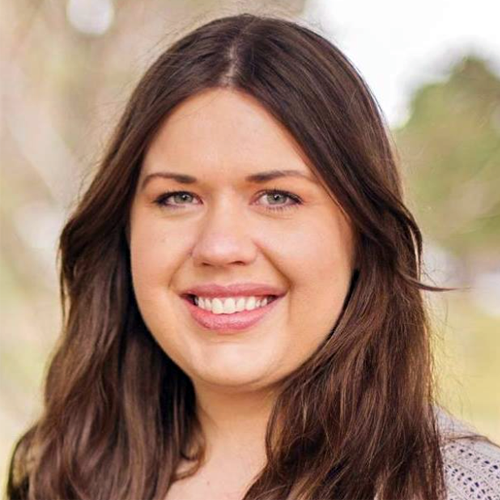 As an undergraduate comparative literature major at SDSU, Melissa (Missy) Watson did not expect to fall in love with the field of rhetoric and writing studies the way that she did. After taking Professor Suzanne Bordelon’s Introduction to Composition Course, Missy was inspired to pursue her M.A. in rhetoric and writing studies. “Professor Bordelon’s curriculum had me sold, and her rigorous yet utterly supportive and thoughtful approach to teaching compelled me to want to study and perfect my own craft as a teacher. She told me about the M.A. in RWS and encouraged me to apply.” Watson quickly found her passion in RWS and credits the program and faculty with shaping her to be the “teacher, administrator, and researcher” that she is today.
As an undergraduate comparative literature major at SDSU, Melissa (Missy) Watson did not expect to fall in love with the field of rhetoric and writing studies the way that she did. After taking Professor Suzanne Bordelon’s Introduction to Composition Course, Missy was inspired to pursue her M.A. in rhetoric and writing studies. “Professor Bordelon’s curriculum had me sold, and her rigorous yet utterly supportive and thoughtful approach to teaching compelled me to want to study and perfect my own craft as a teacher. She told me about the M.A. in RWS and encouraged me to apply.” Watson quickly found her passion in RWS and credits the program and faculty with shaping her to be the “teacher, administrator, and researcher” that she is today.
“I recall fondly learning about and applying rhetorical analysis to research articles in Professor Glen McClish’s Reading & Writing Rhetorically course; contemplating “truth” in Professor Ellen Quandahl’s History of Rhetoric course; challenging notions of “otherness” and “right/wrong” binaries in Professor Richard Boyd’s Modern Rhetoric and Composition Studies course; and learning about and evaluating research methods in Professor Ornatowski’s Research Methods in Rhetoric and Writing Studies course. These courses were all so welcoming, meaningful, and intellectually stimulating to me. And I still have all my papers that I wrote for each of these classes!”
Watson mentions how incredibly thankful she is to have been able to work with Professor Ann Johns. “What an honor it was to work with such an influential scholar in the field of Second Language Writing. Professor Johns helped me to design and implement several case studies of multilingual scholars, to make connections with potential candidates to interview, and to complete a thesis I was proud of. I ended up presenting my findings at my first major academic conference and later publishing a version of the thesis as my first solo-authored publication.”
Watson also reminisces about her time studying and tutoring under Professor Michael Underwood. “This position allowed me to immerse myself in my studies, craft, and academic community at SDSU in ways I had never experienced. Indeed, as an undergraduate at SDSU, I struggled to build community and feel a sense of belonging being a transfer student new to the area and college. But because of Professor Underwood’s welcoming and collegial approach, I quickly made connections with him, with peers, and with undergraduate students.” Watson’s passion for both composition and research is evident throughout all of her educational and professional endeavors, especially when it comes to teaching.
“I can still recall vividly the very first day I taught composition at SDSU. The spring of 2008. The class was across the bridge over College Avenue, in what’s now called College Square. I opened the classroom door with my left hand, my heart pounding, as I was presented with what seemed at the time to be a sea of seated students. I saw only the back of their heads as I squeezed through a tight aisle toward the front of the class, my brand new fancy briefcase in my right hand. As I made my way and faced my students for the first time, I felt absolutely horrified that they’d know that instant that I had never done this before and didn’t quite know what the hell I was doing. This spring it’ll be 15 years since that first semester, and I can still remember some of their faces.”
Watson describes how the lessons she learned while in the RWS program have shaped her into the teacher and researcher that she is today. She mentions that while in the M.A. program, she learned “an invaluable lesson about embracing and facing your academic fears.” As a student, Watson found herself turning down teaching and tutoring opportunities — she would ignore calls looking for “tutors in the ESL composition sections” simply because she did not think it was for her. After pausing to reflect and think about why exactly she was turning down these opportunities, she realized it was because she was scared. Instead of shying away from it, she embraced her fears and volunteered to teach two ESL writing sections, ultimately falling in love with the field. “This moment of fearing unfamiliar territory, leaning into and exploring that feeling, and then facing it head on proved to be one of the most pivotal moments of my academic career.” Looking back on that period of time in her life where she was filled with both curiosity and uncertainty, Watson shares three pieces of advice:
- Rest assured that this program will prepare you well for your professional goals! I have heard over the years just how often students in M.A. programs gain exposure to a field’s content but not experience with its practices. The RWS M.A. program provides both and really sets graduates up to succeed in their professions.
- To all RWS students, not just those pursuing the teaching of writing specialization, I would recommend taking the RWS 796A: Teaching Internship course and, if possible, teaching a composition course or two. I get that teaching is not for everyone, but I also believe many professional writers would enjoy this gig. It’s so engaging and rewarding! I was the only student in my cohort to specialize in the teaching of writing, and I would have so enjoyed having more colleagues in RWS join me and help provide some mentorship to other graduate teachers coming from English.
- Consider getting a TESOL Certificate! I pursued this certificate and used the courses as my electives. It looks great on your resume, but more so, I’ve found the expertise I gained to have been incredibly useful to me as an instructor given that most students I work with are linguistically diverse.
Since completing her Ph.D. in composition and cultural rhetoric at Syracuse University, Watson has incorporated writing through her research and teaching in many ways. She is currently a tenured associate professor of English at the City College of New York, as well as a teacher of composition, and has many academic publications with “more than 15 articles in print and one edited collection, ‘Literacy and Learning in Times of Crisis.’” Watson expresses that she enjoys working with colleagues on publications — one example being an article explaining personal experiences from teachers who are pursuing “raciolinguistic justice.”
Currently, she is working on a “student handbook titled ‘Not Your Mom’s Handbook on Your Language and Writing,’ an edited collection on social justice approaches to addressing language in teaching college composition, and a book chapter on the connections between basic writing and translingual writing.”
Alumni Profile: John Berry Jr
 As a recent SDSU graduate, John Berry Jr. has earned his bachelor’s degree in rhetoric and writing studies and is now pursuing a career in local and state government. He mentions that he wants to utilize the skill sets he learned in the RWS program and put them toward being able to “assist in the implementation and roll out of government programs and policies that will help my community. I hope to use my degree to create effective terminology and channels of communication between the government and its citizens.”
As a recent SDSU graduate, John Berry Jr. has earned his bachelor’s degree in rhetoric and writing studies and is now pursuing a career in local and state government. He mentions that he wants to utilize the skill sets he learned in the RWS program and put them toward being able to “assist in the implementation and roll out of government programs and policies that will help my community. I hope to use my degree to create effective terminology and channels of communication between the government and its citizens.”
Thanks to the program he describes as “the only one of its type in the Cal State system,” Berry found that he was able to use this degree to pursue a number of job opportunities. From his growing interests in film and visual media, to campaign managing and political strategizing, Berry felt that rhetoric could prepare him for these careers, which require direct, precise, and intentional persuasion.
He recalls how “the term rhetoric also piqued [his] interest because at one point [he] only thought of it within the political realm and as a negative connotation”; however, “after reading the course list, [he] became drawn to the flexibility of the courses, from digital rhetoric to professional writing and editing.”
When asked about his favorite RWS course over the duration of his time at SDSU, he jokingly replied, “I can’t pick, that’s like picking a favorite kid!” Nonetheless, he made a point to mention how grateful he was for the smaller class sizes that created “riveting group discussions that [he] found very enlightening.” In addition to how useful he found the class structures to be, he reflects on the most useful skills he picked up from his professors — one being how he learned how to “separate [himself] from [his] writing,” and how “shifting perspectives helped [him] recontextualilze [his] own writing and refine [his] work.”
Berry’s advice to anyone looking to join the program is to not feel intimidated by the unfamiliar name: “the most exciting thing about the program is how approachable it is. I’ve never felt scared to reach out to a professor for help and from the start they were always helpful.” He adds that, “even if it’s not a major for you, the classes you take could help you figure out what you really want to pursue. Learning about Plato and Pepsi could make you realize you want to go into philosophy or business marketing.”
Alumni Profile: Jenny Varrichio
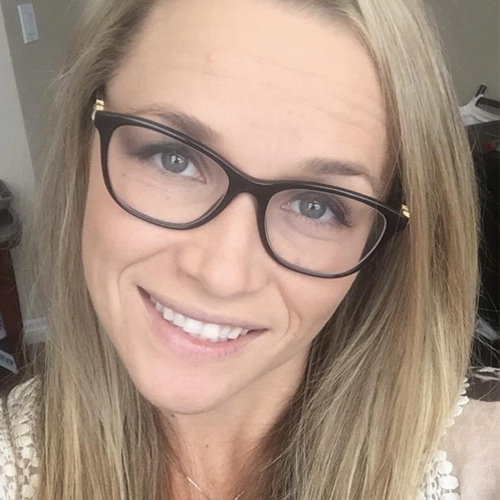 As a current senior instructional design consultant at UnitedHealthCare, Jenny Varrichio reflects on her time as a student in SDSU’s master’s program and is grateful that her degree has aided so much in her current field of work. Varrichio recalls stumbling upon the RWS curriculum and mentions that “it was exactly what I was hoping to find.” In terms of how the program helped her professionally, she specifically acknowledges how she learned to “write and communicate in a way that can be impactful and concise. I was able to apply my writing skills when I went back for my doctorate as well.” After graduating from SDSU in 2011, Varrichio did her doctoral work at Capella University.
As a current senior instructional design consultant at UnitedHealthCare, Jenny Varrichio reflects on her time as a student in SDSU’s master’s program and is grateful that her degree has aided so much in her current field of work. Varrichio recalls stumbling upon the RWS curriculum and mentions that “it was exactly what I was hoping to find.” In terms of how the program helped her professionally, she specifically acknowledges how she learned to “write and communicate in a way that can be impactful and concise. I was able to apply my writing skills when I went back for my doctorate as well.” After graduating from SDSU in 2011, Varrichio did her doctoral work at Capella University.
Varrichio explains that throughout her time in the RWS master’s program, her perception of writing was constantly changing. Thanks to one of Glen McClish’s classes, she was able to learn about different approaches to writing. After an activity that included reading a piece by Daniel Chandler, she describes how “the article introduced different perspectives that individuals might have when approaching a writing project. Some tended to approach writing like a bricklayer. Others could approach writing like an oil painter. The characteristics did not bind one person to a specific strategy, but explored different perspectives and approaches that may be taken. It was a great read not only to use for self-reflection, but also to open my mind and learn more about how others may perceive and address something simple like writing and editing a prompt.”
Giving thanks to another instructor who she thought made an impact on her understanding of rhetoric, Varrichio recalls Cezar Ornatowski’s philosophy on how visual rhetoric is just as important as the written component alongside it. She mentions how “in his class we learned how to examine spaces, design, and things like propaganda to determine what rhetorical tools are being used. After the program, I went on to develop elearning materials and I am now using visual rhetoric in my courses all the time!” Not only was this course a standout in her memory during her time at SDSU, but it also was able to help her decide what to do with her career path.
Varrichio jokes that aside from “constant emails and instant messaging communications,” she consults on process documentation for the business and writes a lot of different learning materials. Outside of her main career, Varrichio serves as a board member for the Federal Government Distance Learning Association with her role being digital communication management. She designs and writes newsletters that go out multiple times a month. Most often promoting webinars, but sometimes including learning resources for those looking to enhance or strengthen their elearning approaches. Had Varrichio not discovered the RWS program, she might have not fallen down this rabbit hole of opportunities.
When asked about her most interesting project, she pokes fun at her writing saying that “while [her] dissertation was the most interesting project, the dissertation itself is super dry.” However, Varrichio speaks with great interest of the current work she is doing along with everything that went into her accomplishments. The preparation focused on qualitative studies that explore the experiences of instructional designers from around the world who employ formative assessment activities within game-based learning courses. She talks about how gauging the audience's intrinsic and extrinsic motivations was essential to the design of the game and how the learning elements that included a narrative of some sort was the most effective, allowing researchers like herself to peer into the process of learning through the lives of adult gamers.
Nonetheless, she reflects proudly on her work and chooses to focus on what the dissertation symbolized and how the action of completing it “represented a life milestone.” Jenny realizes that it was essentially a culmination of everything she learned in her writing career — from essays, technical papers, summaries, newsletter articles, job aids, etc., that made it worth every demand and time-consuming effort as in the end it was incredibly rewarding.
Grateful for her time at SDSU, advice Varrichio would like to pass to any other future and/or current M.A. students includes:
- Read everything.
- Support others.
- Work in time for peace and reflection — really think about how your learning materials are impacting you. You might learn more about yourself, your passions, what really inspires you and where you want to go next.
- Keep learning — seeking opportunities to learn does not have to stop when you finish the program. You finish this program as a professional writer and academic with more tools to use to keep building knowledge and skill. It would be silly to box up all these new tools you have and not use them just because you finished a degree. Enjoy what you have accomplished and have fun learning more!
Meet the Editors
Noelle Higgins
Noelle Higgins is currently a third-year undergraduate Rhetoric and Writing Studies student. She will be studying abroad at the University of Kent in England in spring 2023.
Celia Fisher
Celia Fisher is currently a second-year undergraduate student majoring in Rhetoric and Writing Studies. She will be studying abroad at the University of Strathclyde in Scotland in spring 2023.


